#shakespearean level tragedy i tell you THAT
Text
Love Made Me Crazy

Luke Castellan x Aphrodite!Reader
Part 1 of 2
Warnings: Angst, heartbreak, Reader is referred to as y/n and as female, kissing, implications of death, not proof-read.
Summary: Aphrodite children are required to break their first loves heart in order to avoid tragedy. What happens when reader breaks luke castellans heart in order to save him when he's already on the edge.
A/n: Hi this is my first time ever writing so please be nice. I'm trying my best. Thank you for reading!
~~~~~~~~~~~~~~~~~~~~~~~~~~~~~~~~~~~~
The tears poured as I stared at the lake in front of me. The inability to determine if it were the sobs that raked my body or the cold night air causing me to shiver as I prayed to the goddess I knew to be my mother. I prayed for her to spare me from this "initiation" as she calls it. To spare me from having to break my best friends heart in order to save him and myself.
Luke had been my best friend since the day I set foot in camp. It was 5 years ago. Luke had arrived not long before me, but he still chose to show me around camp. The boy and I became close after that and even closer when the two of us continued to stay in the Hermes cabin as his father claimed him and my godly parent refused to be asserted with me in any way. The comfort shared between us both was hardly unnoticed but it drew our bond close.
And yet now, I have to break this bond we share due to some horrible rule my mother has set for her children. The same rule she set for me, the child she ignored for almost a year after I set foot in this camp.
"Please mom just this once favor me and my choices and allow me to avoid breaking both his heart and mine. Allow me to stay with him without the consequences please." I'd been sobbing prayers like this since the sun set. I knew it was useless. I knew I wouldn't get a response and even if I did it would never be in my favor.
"y/n?" I don't know how long it had been since I strayed from my siblings at dinner to sit here but I knew it had been hours as Drew came up behind me. "Are you okay?" The girl asked, a gentle hand on my shoulder as she sat next to me.
"I'm okay" I nodded, quickly wiping the tears that stained my cheeks. "Just admiring the lake and some alone time ya know?" I let out a fake laugh that sounded almost like a sob as I turned to look at the girl.
"It's about the rule, isn't it?" She asked, a sympathetic look clouding her beautiful features. I nodded in response to which she pulled me close. "It'll be okay. I know you love him but it's better than meeting a horrific end." She says and I know she's right and I know I have to do it soon. "Silena and I will be there to help you through it too. We won't let you go through this alone."
"I know. Its just hard knowing we have to end just because of some stupid rule my mother made. Just another reason why for our parents to dictate our lives." I sniffled and she nodded, combing her fingers through my hair to calm me.
"I understand, love. Its just another reason why our parents won't be winning any parent of the Year awards. However I'd rather you get both your hearts broke than lose you to a Shakespearean level tragic ending." She says, the eye roll evident in her tone as she says the last few words.
I know she's been through this before with other siblings. But even if love doesn't kill me how does she know the next quest won't.
"I just want you to be happy and alive. You'll find other men who will love you, you're a daughter of Aphrodite after all."
But I don't want anyone else.
~~~~~~~~~~~~~~~~~~~~~~~~~~~~~~~~~~~~
The next morning....
I had made up my mind or at least I thought I had stopped by training to see Luke before breakfast and his counselor duties.
"Luke!" I called a smile on my face. I had decided to risk it all. I was in love and nothing could break us apart, not after three years pining after each other and almost a full year together. I was not letting us go.
Luke smiled at me, telling his class to take a break as he ran over to me. Except right before he got to me an Apollo kid was disarmed and the blade of his sword was mere inches from Luke's head, landing right in front of my feet.
The smile draining from my face as I wondered if this was a coincidence. I know I was told there was little time left before an ending began to appear but was it really starting now. Were these the warning signs?
I pushed those thoughts away as the boy came closer after scolding the kids. "Hey, are you okay?" He asked, grabbing both my cheeks gently and giving me a worried look as he checked me for any injuries.
"I'm fine," I gave him a reassuring smile "I should be the one asking if you're okay. That sword almost took your head off." I gestured to the sword with my head as the boy chuckled.
"Yeah, Apollo kids aren't the best with swords." He joked but shook his head, "but I'm all good. Especially now that I get to see you." He smirked before pulling me into a kiss.
That was only the first straw in one big hay barrel that was today. Throughout the day, I almost drowned, Luke almost got run over by a group of centaurs, I almost got shot by archers since no one told me they moved the archery field, and Luke almost fell into the rack of spears.
And all of this happened before lunch.
"Silena you don't understand. I thought it'd be okay if we stayed together but everything is falling apart today. Luke and I have been in so many dangerous positions today it's insane." I practically yelled as the girl brushed my hair.
"Are you sure you're not overthinking everything? It was a rough night for you. Maybe you're just seeing the everyday dangers more today?" Silena was always the voice of reason but I knew it was just excuses to comfort me.
Silena never wanted Luke and me to break up. As she put it we were her best accomplishment and the cutest couple at camp, all thanks to her help for finally getting us together.
"Sil, you and I both know it's starting. I can't lose him cause of my own selfishness. I'm gonna have to break up with him." I say, tears filling my eyes at the thought.
"or you could tell him the truth and let him decide your fate?" She shrugs and I shake my head.
"I know what he'll choose and I can't do that to him. I can't let him decide to be with me when it'll result in the end for both of us."
My mind was made up.
~~~~~~~~~~~~~~~~~~~~~~~~~~~~~~~~~~~~
Luke and I were sat on the docks, the cool breeze of the night blowing between us as we stared at the star in silence, until Luke spoke up and the end began.
"So what did you want to talk about that was so important?" He asked, a small smile on his face as he glanced at me, the hand he was holding between us, squeezed mine tightly until I forced myself to pull it from his hold.
"oh uh, Luke I don't know how to say this.." I sighed as I played with my camp necklace to comfort myself as I spoke to the boy in front of me.
"Hey it's okay. " The boy reached out the touch my arm "Whatever it is we'll get through it together." He smiled gently which only caused my heart to ache more.
I shook my head and stood up quickly in order to look away from the boy and take my chance to pace on the dock as I do the hardest thing I've ever done in my life.
And that's saying a lot seeing as a fought two minotaurs at once.
"Luke we need to break up." I said as quickly as possible, knowing if I didn't blurt it out the words would never come.
"woah what?" The boy quickly stood to come over to me "y/n what do you mean we need to?"
"I mean we can't be together anymore, Luke." I said, tears forming in my eyes as I look up at him.
"Why? I thought we were doing good. Whatever it is we can work through it. Just talk to me. Why so suddenly are you saying this?" Luke asks, tears filling his water line and I shake my head.
"This isn't something we can get out of, Luke. This is something we have to go through in order for me to protect you. I'm sorry, Luke."
And so I ran in order to avoid any more questions, in order to avoid changing my mind, in order to protect the boy I was crazy in love with.
I would have risked my life for him if it meant getting to stay with him for all eternity but I couldn't bring myself to risk his life for a life on the run from a never ending tragedy.
If only I wasn't an Aphrodite Kid....
End of Part 1.
Next part will be Luke's POV and where more of a dark Luke esc will come in and as well as the aftermath of the moment. Again thank you for reading and I hope you enjoyed!
#luke castellan#percy jackon and the olympians#luke castellan x reader#luke castellan x you#percy pjo#fanfic#charlie bushnell#luke castellan x aphrodite!reader#aphrodite
67 notes
·
View notes
Text
The Definitive Damsel Analysis (if I do say so myself)
(Disclaimer: I know it’s absurdly long, and for that I apologize. I apparently am more unwilling to make cuts than I am to present subpar work. I’m working on it. Only editing I do for my autistic ramblings is copyediting, baby! Whoo! I will be updating this for the Pristine Cut once it comes out and we get even *more* Damsel. Obviously, as I’m sure you can tell from the length, I really like Damsel. There will be all of the bias. It will be great.)
(Author’s Note: For the love of the most high God, it took me like twenty read throughs for me to standardize what I wanted to call the Scorched Grey. Here is a brief list of all the terms I used to refer to her: Scorched Grey, Burned Grey, Burning Grey, Fire Grey, Damsel Chapter 3. Sometimes but not always preceded by “the” or “The”.)
Alright, ladies and gentlemen. I have oft made the statement on here that Damsel is the best route in the game, and this began as me trying to definitively prove that, by microscopically going through the route, I could establish exactly why, it would seem, that Damsel has objective superiority. It sorta… evolved, though, so instead I will be going relatively chronologically throughout, and trying to point out a couple things that all of you know about and maybe a couple things you don’t about the best character in the game. With that preamble out of the way, let’s begin with the goofy stuff, the grab bag if you will.
This will certainly be more personal taste than anything else, but I do think there’s a lot of miscellaneous stuff that Damsel does better than the other chapters. For example, I am convinced that it has the third best music, behind Tower and her routes and then Thorn. I am genuinely obsessed with “It Was Always That Easy”. The basement has some *fantastic* art, and I think that really carries a chapter that is otherwise generally bland when it comes to actual visual activity. It’s really carried by its genuinely perfect dialogue.
Overall, and most importantly, this chapter is the undisputed master of the idea of positive ambience. You know elevator music? How it’s there to artificially increase the cheeriness of an otherwise dreary moment, like a hotel hallway or, yanno, an elevator? Well, this is the chapter that does it perfectly. Everything is designed to make it “nicer” than it actually is. The Narrator even takes that into account when describing the basement. The sound design is fresh and relaxing, the music is uplifting, the Princess’s voice is obviously fantastically done, but also the Voice of the Smitten plays a large role in making it feel “good”. It’s something that exists in order to communicate exactly the feelings it wants the player to feel, which is all warm and fuzzy inside. But let’s move on to the actual content, shall we?
Damsel has *the* best Chapter One and it isn’t even close. Certainly not in the horror department, where I think Beast and Nightmare shine, or even in the whole characterization bit, where the award can only go to Spectre and the masterclass that is her Chapter One. But Damsel has something else to it. Damsel has tragedy, almost Shakespearean in nature. Nobody else has it (except Witch, to some extent, but nowhere close to the same level), nobody manages to reach that connection, there and then broken, to honestly feel for both Princess and Slayer. Allow me to paint a picture of a playthrough.
You are on a path in the woods. At the end of that path is a cabin. In the basement of that cabin is a princess. You are here to slay her. But you don’t do that. That voice itching in the back of your skull, the one you quite literally call Hero, your moral compass even, raises some objections. You don’t want to kill *anybody*. That isn’t something you want to mark yourself with, especially not solely on the word of an individual you just met. For now, violence is a nonstarter.
You enter the cabin. And you hear her voice. And you see her. You even talk with her for a while. The moment is… hypnotizing. Despite the Narrator’s warning of manipulation, well, you cannot help but be manipulated. This is a genuinely nice, sweet, scared Princess who simply wants to be free. You have to save her. It is the right thing to do, it is the… only thing to do. Anything else marks you with the dirtiness of simply being unwilling to help someone in need when you had the full ability to.
You go to get a key. Unsuccessful. The door locks. Even worse. The Narrator is moving from irritating to downright malicious, clearly enjoying recounting the lock of the door. Disgust for Him has been present since you entered the cabin, but it shifts to anger very quickly. That shift continues with full force as you attempt with what little ability you have to save the Princess, even if you don’t quite know how you will get out. The question does not last long. For the shift to anger shifts once more, to a sort of incomprehensible fury.
For the Narrator has crossed a line. Not only has he taken away any semblance of choice, not only has he raised your own knife against an innocent, someone who has been nothing but kind to you, but you are the one who must bear the shame for it. You are the only one who is doing the foul deed in any eyes but your own. Speaking of, the Princess’s eyes are filled with genuine happiness at the moment, as you are finally giving her the freedom she has yearned for such a long time. Yet through no fault of your own, you raise the pristine blade, the one you refused to bring down to the basement in the first place. You scramble through the list of options, attempting to find anything that could provide a sliver of hope in the situation, anything without the grim finality of “Slay the Princess”.
At last, you find one, and are able to bark out a warning to the Princess. That happiness in her eyes is shifted to a look of fear, one directed at you alone, one condemning you with such a sorrowful betrayal that it almost hurts to see. She begs for you to stop, and then she says something that almost calms the internal storm of the player: “Please, I know this isn’t you.” She recognizes that it isn’t us that betrayed her, she understands that we aren’t trying to do this, that we are flat-out trying to stop it. But the eye of that storm is passing, and soon.
And as she takes the blade, as she prepares to do what she must to live, that same look of tragic betrayal crosses her eyes, this time not directed at us, but at herself. She hates that this is her only option, the only way that she can live is to kill another, one with every intention of freeing her and no intention of harming her. And in the end, she simultaneously underscores the tragedy of the moment while confirming our perception that she could never be a threat to the world. As she plunges the blade into our chest, she has failed to even do the bare minimum of making our death painless, something that fills her with even more guilt, tears streaming down her cheeks as she tries and fails to end our own agony. The last thing we see of her are her endless cascade of both tears and apologies, as everything goes dark.
This… is beautiful. A glorious tragedy, one with limited theming, simply two characters with emotions that feel natural. And, quite strangely, the first chapter has almost nothing to do with the second chapter. But it is still important. I’ll get to that later. Better things await now! For with the end of the tale of the Hero and the Princess, we have a new individual, everyone’s favorite buddy, the Voice of the Smitten.
I am certain I do not need to underscore just how popular Smitten is. Easily the most fan favorite of the fan favorites, especially solidifying his place within that roster with the Kiss from a Thorn. He is jovial, passionate, he is Don Quixote, complete with the unlimited self-delusion that comes with the territory. There’s a reason people love him. Romantic in a game entitled a love story, the largest of personalities in a game stuffed with them, he is the storybook hero come to life in a game that has just as much reverence for storybook heroes as the deconstructions of them. In short, he is the visage of likability itself, with all the bombast that comes with that. Yet that is only from a wholly external perspective.
For what I am certain I do need to underscore is just how sinister Smitten is. For all of his likability, the Smitten is also probably the single slimiest voice out of all of them with the possible exception of the Opportunist. This is not a new revelation – people have understood that since the beginning with his frankly disturbing behavior regarding the Princess. What is perhaps more interesting is his relationship with the player. For he is one of the two options that reflect the player at this point within the story. Either the player is trying to do the right thing and free an innocent, or they have somewhat… different motivations.
The former reflects the Hero. Somewhat naive, in many routes somewhat bumbling even, but first and foremost focused on the external. That is, “how can I make a positive impact on the world around me?” As contradictory as it may seem to how the Hero is presented, it’s something of an intellectualist approach. The Hero is trying to find the best possible world and working towards that with all of his might. It is, one could say, devoid of emotion except that determination to change the world, to make it a better place. While the goal remains the same, the path to get there is fundamentally continuously being calculated. The Hero is your conscience, and as such he must *always* work overtime for that.
The Smitten is not that. No, he has made no secret that he is the path of passion. Even when he is generally considered to be a better person, he declares that, “Whatever world would condemn two star-crossed lovers to a cycle of violence and despair isn’t a world worth saving.” His focus is internal, it is on ourself and our romance. There is no extensive study into what is the correct option, there is only what would assist in our relationship, which is somehow ordained by the universe. To put it into understandable terms, Hero is a modern hero while Smitten is a Romantic-era hero.
There’s an important line when going down the stairs that I think speaks volumes about the type of player and playthrough currently occurring. That is “We can still do right by her without all this over-the-top fawning.” *That* is the line of demarcation between the route of the Hero and the route of the Smitten. If you decide to embrace or repudiate the Smitten at that point, I think the route is sealed. I am convinced that the game will continue on in a fixed way based on that philosophy. The point where you must, internally that is, decide if you are doing this out of a desire for what is right, or an infatuation with the Princess.
Now, of course there isn’t anything wrong with taking the path of the Smitten, and it’s personally one of my top points in the game, but whether you admit it or not, you are long past morality being what decides your actions. That has come and gone. Now, the goal is to express the passion of the moment and delve into your romantic relationship with the Princess. I’ll be evaluating each of the routes differently, loosely organized with a focus on how it reacts to the player. After that, I’ll go on into theming of each route one by one and all that jazz.
The path of the Smitten first. The player embraces that he has been sent to save the Princess from her unjust and foul imprisonment above all else. So that is what he does. He marches downstairs, the blade being nothing but a passing afterthought as it is immediately dismissed out of hand. When it comes to the crucial point of “doing right by her”, the justification is made that two things can be done at once, that you can do this for her and do a little bit of fawning on the way. Doesn’t harm anyone.
And with that the basement arrives, and you see the Princess on the floor. She is perfect in all ways. There is nothing wrong with her. And that’s before you start talking to her. When you do begin talking to her, all of the kindness and innocence from Chapter 1 are magnified to the greatest degree possible. She can do no wrong. And, from a meta standpoint, there’s another thing that stands out – it is really, *really* funny. From everything the Smitten says to the “Then I didn’t end the world!” to the Narrator’s (a villain at this point) growing exasperation at your trust for the Princess, it endears you to the moment even more.
Because it’s not only that it’s funny. It’s not only that the Princess is genuinely nice to you. It’s something more than that. Something that I am loath to talk about but will anyway. The Princess is incredibly – *sigh* – **cute** within this chapter. This is objective, with science to back me up, I’m sure. But she is specifically designed to be as heartwarming as possible, and every line makes her more and more into someone who should be saved by you, into, well, a Damsel. While it isn’t explicitly stated, throughout the progression of dialogue, the need to protect her becomes more pronounced. You were already primed to like the Princess, you already internally committed to a romantic future. But after stepping into the bear trap willingly, you cannot escape.
And if you’re anything like me, you are perfectly fine with that. So you take in the moment, you rescue her from her chains and laugh at the way her hands slipped out of the chains and the Narrator’s comical anger at it. It’s all very feel-good, all cleanly written dialogue, and both the Princess and the Smitten are likable, they’re fun, and the Narrator is a fun enough villain for the Smitten and you to unite against. The Hero, if we’re being honest, barely registers, and if he does it’s usually as an extension to the Narrator, as a foil to yourself. And with her finally free, she embraces you, sealing the deal on her perfection.
And after that, something else happens. The deconstruction begins. You want to see if her dialogue has any more of that saccharine present throughout the rest of the chapter, and are immediately rewarded with the “The princess closes her eyes in deep reflection” and the follow up joke. Hungry for more, you click through some more of the dialogue, but something begins to happen. She begins to… unwind. The Smitten seems to reciprocate in turn, to a lesser extent. In fact, she really starts to return to the horror that this chapter was a nice respite from. So you cut your losses, decide to leave with her, and everything returns to normal. Bathed in the glow of your future, you immediately forget about the deconstruction.
After that, you finally get out of the basement, get a genuinely great moment opening the door alongside the Princess, never think twice about clicking “You’re not doing that.” as fast as humanly possible, and finally await the door at the end of the cabin. You finally get your fairytale ending. The princess goes out into the world together with you. You brought her out. And then she is taken by the Shifting Mound in a way reminiscent of her dying. Even if this wasn’t your first playthrough, it still comes as a shock. For the most part, you were being that Romantic hero, living in the moment with your passion. The thought of this happening was gone entirely. This wasn’t supposed to happen. And it *hurts*. And the chapter is over.
The route of the Hero has a different point of view on the whole situation. That’s not to say it’s not easy to get drawn in by the hilarious dialogue and sheer cuteness of the Princess – far from it. It is, after all, what drives the conflict within this. For the Hero, and the player that goes along his path, has one bit of information stand out. That the world ended after the Princess killed you. Now, you can naturally be skeptical of the information, but the Princess isn’t helping her case here. Entirely vague, entirely unwilling to mention anything about it. The only thing she seems to care about is getting on your good side.
Now, you still want to save her. That much is clear. You still don’t take the knife in the beginning, and you saw her Chapter 1 incarnation. She is still a good person, kind and loving. But there are questions raised, important questions. Which is why not all Hero routers get the same ending. There is a conflict between how far you’re able to go before the risk of the world ending eclipses your distrust of the Narrator and your trust of the Princess. If the whole world really does end if she’s free, is it worth it? And as such you get to the major points of the Hero ending.
The first is the Deconstructed ending. As you question the Princess, you desperately try to figure out what the best way to go forward is for you. And that starts with getting a straight answer from the Princess on what exactly she plans on doing. The operation… does not go well. As you try and push for anything, any sign that she isn’t going to end the world, the same rejoinder comes in, alongside a distorted track. “I just want to make you happy.” The Princess is not an individual anymore, and begins to change shape. But you are locked in with a horrified inability to look away, like one who sees a car accident. And with that, the Princess is a Princess no longer, and the Shifting Mound takes her away.
There’s also the option of taking the Hero’s advice when confronted with the scenario: to leave. You don’t like what’s going on and you try to do whatever you can to undo the doing. Perhaps surprisingly, it works. And then you’re forced to deal with the cognitive dissonance of the Princess and *that* being the same individual. But you, not without a healthy dose of skepticism, still head upstairs alongside the Princess. In the end, you can’t bring yourself to kill her. Throughout it all, she still has been the beautifully endearing picture of innocence, if a questionable one, and especially with regards to the knife on the table, there is no way you can take it to her chest with no warning, especially after everything you did in the first Chapter. So you leave with her, and the “end of the world” really does come in one fell swoop with the call of the Shifting Mound. You can’t help but wonder if the decision you made was the right one, not really. Like, you still believe she didn’t deserve to die, but maybe, just maybe, it would have been a better ending.
So what if you did kill her? What happens when love *truly* melts away into skepticism. After the continuous question dodging and whatever the… other thing was, this is clearly not an ordinary Princess, it is not the same Princess that you tried to save at the beginning. There is only a sliver of her, a shadow of her former self. Slaying her, well, slaying her is probably doing her a favor. It might be doing the world a favor, too. Maybe she is an individual with malicious intent. And as you take the blade and plunge it into her chest, you instantly know you made the wrong decision. She does not oppose it. She simply lets you kill her with a single tear hanging in her eye, saying “I think this is what you want.” It’s meant to feel dirty and it does, even heartbreaking in the moment, although it is immediately counterbalanced by the effect of the Smitten killing you over it.
I won’t exactly go over Scorched Grey the same way, I think there’s generally only two frames of mind going into it, and that’s either the standard “Hero-Skeptic” framework that I’ll expand on later, or simply a completionist mindset. Plus, it’s technically not The Damsel. Plus I’m lazy. But this is the point where I will try to expand on the theming of each and every route and mindset to go through within the Chapter, and that *will* include the Scorched Grey theming.
It’s made quite clear from the chapter that one of the primary themes is objectification, the making of the Princess into nothing more than a vehicle to live one’s fantasy into. The taking of an individual and making them into an it. The destruction of humanity by your own desire, and what that says about your desires in the first place. Ironically, this is merely one fourth wall away from the rest of the Princesses, each of them being a piece of fiction that many simply engage with *because* they are an object, but with the Damsel it is directly nodded to within the narrative. One meta-layer is peeled back, if you will.
Nothing hammers this more home than the entirely jarring line that escapes the Shifting Mound’s lips when you ask about the vessel she holds. Unlike the rest of the fragments, which are all given an indication that they have been fulfilled after the Shifting Mound takes them, the only note she has to say is that the Damsel has “served her purpose”. There is nothing that she wished for, as anyone who has obtained the deconstructed ending can attest to. But even in the more standard runs, she is simply a tool to be used and discarded. And there are three general reactions to this line.
The first is the hardcore Smitten route’s preferred choice, denial. “The Princess was far more than an object, she had character, she had kindness, she had motivations from the beginning! The narrative is what is wrong, there’s nothing wrong with the Princess. She. Is. Perfect. Not just from a narrative standpoint but a metanarrative one as well. She has depth, she *is* a character.” All in the hopes that if they insist on it enough, it will become true. The Damsel was not designed to be viewed in a vacuum. There are themes that run through her character, and including negative ones, and the denial of them is a far truer denial of the character than any sort of objectification could ever be.
Then the more moderate Smitten routers get a different response. A slap in the face. They did all of this, they had fun, they laughed with her, they cried when she was taken. They were connected to her, they had a real connection to what she was. One could even accuse them of… loving her. They honest to goodness cared about this Princess, they were invested in her story. Yet, in the end, they also formed her around themselves. They “molded her to love you”. As much as they loved the Princess, that was only because they cut out a piece of the Shifting Mound that they *could* love, a caricature of her true nature. They still took an individual, and despite truly loving her, made her into something that she was not so they could do that very thing. She is not a person. She is a plot device, an individual made to love and be loved with nothing beyond that. She is an object.
Lastly, those who went on the route of the Hero get that same slap in the face, that selfsame bucket of water poured over their heads, but in a different way. They didn’t try to objectify her. They didn’t want anything of the sort. All they wanted to do was the right thing. Right? Yet even in that desire to do the right thing, they still get that same chilling text from the Shifting Mound. They have built an individual just like those who went on the route of the Smitten. Just a different one. Not one who was built around your “glorious romance”, but rather one built around something of a glorious Romance. The need to be a Hero. The desire to do what was right, to save an unjustly imprisoned Princess. The Princess became a plot device in the end anyway, just one that needed to be saved rather than one who needed to be loved.
I want to continue off of that. The player is trying to do nothing more than the right thing, he is simply doing what a Hero should. And that determination to do what is right leads to him getting impacted the most by that line in the ending, the line that implies that whatever right he was doing, he was still being driven by selfishness, by that need to be a Hero. That hits the player right within where it hurts, it almost could be said to strike at the one emotional vulnerability of them. To have your hard work, your pain, your desire for what is right to be considered nothing more than the delusions of a Don Quixote tilting at windmills in order to fight giants, just as lost as Smitten, that doesn’t feel too great. It almost minimizes your struggle, and it is genius. You play as a Hero because you want to feel like a Hero, not because the morality of this world means anything to you. It is stripping that meta-layer down one by one.
But objectification is not the only theme present. While it may seem like something of a potpourri topic to throw in, earlier on the server we were talking about the Damsel in particular’s perceptiveness with regards to perception. When the door shuts and locks, it is the first and only time the Princess gets visibly **negative** in any way during the entirety of the Chapter. Even when you kill her, she still does so with nary a frown on her face. Even as a tear rolls down her cheek, she still smiles. But not at the door. The narration points out quite clearly that she frowns. This is, I reiterate, the only thing that happens. And her response is not “we’re stuck down here”, it is not “I’m unable to leave now”.
What it is happens to be “that’s not supposed to happen”. She recognizes the construct in a way very few allude to within the game. Adding onto that note, within the Scorched Grey chapter, she (correctly) determines the very nature of the construct and that inherent “cycle of violence and despair” inherent to it, even (correctly) determining that the only way to leave was to annihilate that very construct. This is shown even clearer at the other major event at the door. When you ask if the Princess can open the door, the sole question she throws back at you is “Do you think I can?”, and after a response in the affirmative, “Then I can”. In the end, it is quite clear that she is, *heavily* ironically, one of the more aware characters in the game with regards to your circumstance.
While speaking of the Scorched Grey, I think this route also exemplifies another major theme – the nature of the Princess as a being of perception. All routes exemplify one facet of the Shifting Mound: Spectre represents the gravity of her, Tower her divinity, Prisoner the very incarnation in and of itself of her within the construct, and so on. Damsel has something different, though, and that is that she’s just a slippery little fella. Far more than anybody else, Damsel changes throughout her chapters, in ways more pronounced than anybody else. The Shifting Mound declares that we “molded her to love you”, as I quoted previously. That molding takes stage front and center throughout all of our interactions with her.
The most obvious example is her deconstruction, which when her sole true motivation (to leave) is discarded, she begins to break down, unable to offer to the player anything beyond the only desire every other Princess has. With the compulsive need to love the player, etched into her core, there is nothing she can do other than try to add to that love, losing herself within the process. But that is not the only time she changes. Because she is willing to give up that freedom in, well, a heartbeat. Attempting to kill her does not lead to any sort of resistance from her. The one goal she had, staying alive and winning her freedom, is out the window despite being (questionably) willing to kill for it in the last chapter. Now, throughout the Scorched Grey, it’s made clear that she did not, in fact, want to die, that she just wanted to be free together, but the complete unwillingness to save her own life is a stark contrast to the first chapter.
In fact, that perpetually changing nature alongside her being so objectified means that it’s really, *really* hard to figure out her true character. There is very little in her that does not change and very little remaining that isn’t specifically put there by you. She is an eel, wriggling out of your grasp and impossible to pin down, in a large way like the Shifting Mound herself. But… for the most part, there are two facets to her character beyond the already listed themes. And a sharp divide between them.
Chapter One Damsel and Chapter Two Damsel are not the same person. That’s usually true for most of them, but they also usually have some semblance of similarity between their counterparts. The only exceptions I can think off the top of my head are Spectre and *maaybe* Stranger if you want to count that. The rest of them act as exaggerated versions of the existing individuals shown. Chapter One Adversary likes fights. Chapter Two Adversary likes fights. Chapter One Witch is built on the back of distrust. Chapter Two Witch is built on the back of distrust. Everything lines up nicely.
That is not the case for the Damsel. The only thing that you can say with both of them is that they are nice and do not want to hurt you. The Chapter One incarnation (henceforth Princess) is a tragedy of a character that doesn’t want to kill you but still must to secure her own life and freedom against a renegade puppeting you. The Chapter Two incarnation (henceforth Damsel) is a Horror-”Feel-Good”-Comedic-Tragic character that shows nothing about the emotional anguish she went through in chapter one. I love both of them, but they have an unmatched disconnect. And I think that sort of adds to the character. Now, there is absolutely a benefit from an emotional through-line (there’s a reason Thorn is my second-favorite chapter), but in this case, only brief touches to the beginning enhance the story.
The most striking thing is the sense of comedic horror that comes when Damsel just completely ignores any expected trauma from the Princess’s emotional destruction. It, depending on the route you take, either makes you love her character more and more as the humor begins to entrap you, or it begins the process of getting the player unnerved, exactly like the developers wanted. It is a key dividing point in the mindset of the player and the route that they have chosen. The Damsel says nothing about what happened, heck, she barely acknowledges it except to indicate that “You died!”
Secondly, it sets up Damsel as a sympathetic figure while still allowing her to begin establishing herself. Without the setup from the Princess, the player has no idea how to view Damsel, potentially even seeing her as a less on-the-nose Razor, with her comedically hiding her sinister intentions. The Princess allows the player to begin on a note that the Princess is *actually* friendly rather than simply pretending to be so. At the same time, it’s divorced enough that apart from that frame of reference at the beginning, Damsel is still allowed to shine within her own character.
Lastly, and most importantly, it sets her up for the Scorched Grey. The guilt at causing the death of an innocent and the belief that you would be unable to cause the death of an innocent yourself leads her to blame the construct and attempt to bring it down, which seals your fate in the third Damsel chapter, the only time where the two chapters meet in a beautiful climax of Passion going too far and causing pain, in attempt of running away from that very thing, morphing into something that not even the Smitten is able to remain devoted to in an awful tragedy of love being not enough in the end.
Wait, wait, wait. Did I hear “the end” being spoken? At this time of year? Localized entirely within this essay? Well then, it’s time to talk about what puts this saga at pure perfection, shall we? I probably could just use the awesome power of Ctrl + V to get the desired effect, but I still do want to offer my narration, so I’ll compromise and do a bit of both. “Your lover drives a stake into your body. And another. And another. And another. And another. Do I miss your heart because I cannot stand to see it go? But the stakes meant nothing to you. You had a desire, and you set that desire free, you lifting me and me lifting you, forever and ever and ever, consumed by true belief, there was nothing that could hold us back.”
Do I even need to explain why that’s so good? Definitively the best poem in the end, it isn’t even close, especially when coupled with Ms. Goodnight’s awe-inspiring delivery. Did I say that the Scorched Grey was the perfect synthesis of the Princess and the Damsel? I was lying. This is. Every word so lovingly placed, the language sounds like it comes from the pen of God Himself. It is emotionally resonant, the art is beautiful, I have not run into such a short piece of dialogue that outdoes it. Gonna be honest, mostly just wrote up this essay to gush about it. Even now, it is considered by most everyone to be one of the best lines of dialogue in a game filled with magnificent ones.
And the other one, that of the Scorched Grey. It’s simpler, ironically. “I kill you. You kill me. Back and forth we go, faster and faster and faster. I kill you. You kill me. Hollow eyes watch from the dry corners of a memory. A home built on all of the futures that were supposed to be, preserved until the moment of reunion. The fire of the heart sets it all ablaze. I kill you and me.”
This, this right here is one of the most slept on ending poems and it’s not even funny. So fantastic at expressing the heartbreak inherent to the Scorched Grey’s character. I don’t know how you can see the line “A home built on all the futures that were supposed to be”, especially with the Scorched Grey dead and charring in a wedding gown, and not feel *something*. It’s not as good as the standard Damsel stuff, but then again, nothing is. It’s still deserving of more praise than it currently receives, and one of my top three ending poems of all time, only edged out by Prisoner. Gosh, this game belongs in a museum.
Seems I need to debunk some stuff that happens to get a lot of traction regarding those who speculate on Damsel, too. First of all, her character motivation is not guilt nor gratitude. That sort of thing works incredibly well in fanworks, and I’m happy to see it ~~because that means I get to see Damsel in a fanwork~~. It has little to no backing within canon. Damsel is a chapter about the only motivations for the Princess being those put in place by the objectification of the player. There is nothing regarding anything beyond that, and it detracts from the existing, well-elucidated themes that are actually within the chapter. The only sort of substance to them is both Chapter 1 Princess and Scorched Grey indicating guilt for killing you, but that is almost entirely repudiated within the actual Chapter 2.
Speaking of the Scorched Grey, another thing I saw somewhat extensively is that you somehow “taught her” that killing is the way to love one another, and that’s why she kills you in Chapter 3, and I honestly do not know how that gained any traction at all. It’s pretty clear that she views all the death as a pretty terrible and messed up thing and only kills the two of you to escape the cycle of death. It’s spoken of as a means to an end, not an end in and of itself. I am genuinely confused on how this got started, because it really just… opposes the main *in-narrative* themes of the Chapter??? Like, you don’t even have to analyze it, it’s just within the text, plain and simple.
Anyway, I deeply apologize for the length of this once again, look forward to an appendix when Pristine Cut comes out. I’ve already played it because my uncle works at Black Tabby, but I don’t want to spoil it for you gents. If my opinions change massively after playing through the new update from today, I will change that too. Anyway, Damsel is the best character, literally does not do a single thing wrong within any of her chapters, has definitively the best Shifty stuff, and you should invest in her. As more people vocally become willing to throw money at anything related to Damsel, the likelier it is that we get Damsel merch. I need it so badly. Please. Anyway, if anything stands out to you or you disagree, I am begging you to tell me to get my act together and explain what I said wrong, so do that. Also please.
#slay the princess#the damsel#the princess#black tabby games#I spent an ungodly amount of time writing this up#But I honestly think this could be the be all end all work for this tiny character in a tiny game#Also#Seriously#Play Slay the Princess
59 notes
·
View notes
Note
How would you rate each version of Duncan from the Dune series and of his love/shipping interests whom do you think he had the best and worst compatibility/chemistry with?
Oh i love you for this question because i've been making silly little rankings in my head for YEARS and you just gave me a reason to unleash them in the wild
So, when it comes to Duncan i think the first thing you gotta take in mind is that his original version had a thing for lady jessica (love or whatever), and it's implied in some of his other relationships that she's always there in the back of his mind somehow.
Duncan and Alia: okay let's start with the one that irks me the most. Alia is my daughter, my beloved, my everything and i hate that she had to be overshadowed by her mother even during her marriage. but it's not jessica's fault, it's stupid duncan that saw jessica in alia, and someone even told him at some point. i don't remember who, i think it was jessica herself??? also you're a psychic living computer whatever HOW can you not see that your wife is being possessed by an evil presence. GOD. i'm obsessed with the tragedy of alia and i loved those scenes when duncan realized she was gone and he started crying ugh. chef kiss. very shakespearean if you will, but yeah Alia deserved a better companion so i'd rate this a 4/10 at best. four points for the tragedy and nothing more
Duncan and Hwi: 0/10. -1183948/10. this is the worst. not even tragedy can save this mess of a ship. hell it wasn't even a ship it was just wrong. poor hwi was paired with the worst men ever and then died??? wtf!! that was terrible for women in general. Not to mention god-emperor duncan is the worst duncan of them all i hate him so much you have no idea. he was a sexist homophobic dumb piece of shit and i hate that he survived and probably died peacefully with siona. also something tells me his encounter with hwi wasn't very consensual you know? maybe the way it was written was ambiguous, but i got the feeling she wasn't really sure of it and it did nothing for the plot, it made no sense. just a bad vibe in general
Duncan and Siona: meh, we don't see much of them, we just know eventually they got together and had a lot of babies and saved the atreides. i've always felt like siona was a half written character, we saw her in the beginning and she's a fearless rebel with a mind of her own, but then in the end she succumbs to the insanity of leto II's grand scheme of things and she seems more like a puppet in his hands. i don't know i'd rate this a 3/10 just because we don't see much and i think they were forced by the events and nothing more. P.S: i would have to look on the dune encyclopedia for more details, maybe they actually liked eachother like ghani and farad'n but i'm not sure
Duncan and that Jessica pseudo clone: they are mentioned briefly in god-emperor i think and it proves once again that this man had un unhealthy obsession for jessica (an assumption based on the fact i don't like him and jessica didn't either. stay with me you know i'm right). but yeah they were happy i guess??? i'm sure if some guy resembling duke leto showed up that jessica lookalike would have dropped duncan's ass in one millisecond though. 6/10
Duncan and Murbella: oh we really are in it aren't we. now THIS is a fucked up relationship. they get a higher score because she's as fucked up as him, and i appreciate equality. But hell duncan and murbella are insanity at the highest level. She imprinted on him when he was a teen and he reverse imprinted on her and they got stuck in a weird sexual curse???? peak madness i just. i don't even know what to say, if i didn't read god-emperor before heretics i would have said this is the most insane thing frank herbert did in these books. but anyway, we actually get to see a little more of their relationship (or maybe situationship, i don't even know what to call that thing they had) in chapterhouse, they are addicted to eachother and made a ton of babies for the bene gesserit. i would say there's tragedy in them as well and even though i know they dynamics that got them stuck together is not healthy and ok and they are by far the weirdest pairing in the entire six books, i'll be honest i was saddened when murbella eventually choose the bene gesserit over him. the scene when she's going through the ritual to become a bg and he's desperate to lose her might have moved something in me. idk. i give them a pass because they are fictional and weird, but overall they are a solid 8/10 to me. and i appreciate the fact that duncan was finally able to have feelings for someone who didn't have 95% of lady jessica's genotype
Duncan and Sheeana: meh. they were meant to be according to the bene gesserit plan, and they did seem to have some sort of bond in chapterhouse. but i don't know, i feel like they were two kids manipulated by the bene gesserit in different ways, and nothing more. But since the saga is incomplete, i'm sure the final book was supposed to explore their dynamic as well. i would say 5.5/10 for the potential (sheeana was super cool on her own and i like to think they could have joined forces to take down the bene gesserit and fall in love while they were at that. but it's all in my head so idk.)
i'm at the end of this long ask and i realized you asked me to rate Duncans and not his relationships. oh well (i had a drawing planned for that years ago). my apologies
Original Duncan: 10/10. bestest boy. gone too soon. he was one respectful king
Messiah Duncan: you know what despite everything I DO LIKE THIS DUNCAN. 9/10 bc he has cool metal eyes and he's very similar to the original Duncan in a lot of ways. should have treated alia better though.
God-Emperor Duncan: get this fucker out of my sight. 0/10.
Heretics baby Duncan: just a baby. an innocent soul. my son. you deserved to live a happy life with your adoptive dad Miles. 8.5/10
Chapterhouse Duncan: a pathetic loser trapped in a toxic situationship with a computer inside his head. he did try his best let's be honest. also a skinny legend. 8/10
42 notes
·
View notes
Note
I m sorry this will be a shitty idea :,] [ if reqs aren't accepted in here then just ignore me ]
JUDY/FEMALE V ft Mr silverhand cause how does choas not happened without the man who blew up arasaka
V stealing a kiss from ms alvarez while she's smoking ? Win for Johnny and a win for v ft Johnny encouraging v about it lmao > glitter anon
Hi nonny!! Thank you so much for the suggestion :D I wrote a little something something for this, hopefully this fits along the idea you were thinking!
--
V didn’t smoke. Never had, never wanted to. Enough second hand smoke clogged the sidewalks of Night City that she didn’t need to ever put a cigarette to her lips to know what it tasted like.
There was something enchanting about the play of the lights around the thick haze swirling around Judy as they sat thigh-to-thigh on the rooftop edge of the building. Charter Street hummed with life below them, cars zipping back and forth in a synchronized drone of tired thumping through potholes and honking horns. Further out, the sprawl of Night City glimmered with neon, the echo of advertisements in the heart of the city reaching even here.
Judy inhaled again, puffing out another cloud of smoke and turning her face up to the sky. According to her she hadn’t smoked until Evelyn…
Well, until all of this happened.
“If you don’t stop giving her lovesick puppy eyes I’m going to be sick.”
Johnny’s voice grated through her mind, the engram himself shimmering into existence on the other side of Judy. He mimed an exaggerated, Shakespearean level look of longing, kicking his feet back and forth off the edge of the building.
Tsch, V glared at him trying to beam the image of a middle finger in the link between their minds. From the shit eating, arrogant grin he flashed at her it worked.
Then Judy sighed, lifting the cig to her lips again. V watched Johnny as his eyes followed the entire movement, genuine longing replacing his performance and matching the sudden craving that flashed through her.
She had to bite her tongue from speaking aloud and to keep her mocking words inside her head, ‘Hey asshat, stop eye-fucking the cig or I’m going to be sick.’
Johnny, unlike V, could fip her off without being seen. And he did with both hands.
“Hey V, where’d you go?” Judy’s bemused voice broke through her glaring contest with Johnny and she blinked to find Judy staring at her with a soft quirk of her lips.
“Oh ya know, just thinking.” V’s eyes darted over to Johnny, who made a gagging gesture before glitching out of her vision. The neon lights of the city caught the last glimmer of his silver hand, giving her yet another middle finger with gusto.
‘Dick.’ She thought.
‘Bitch.’ He responded, unable to let her ever have the last word like an immature, bratty teenager.
And perhaps she was equally immature given that she would’ve continued down this ongoing, middle-school level bicker-fest if she didn’t have the most beautiful women in Night City smiling at her like she was the sun on a rainy day.
Man if there was one thing to come out of the shitshow of a job that Evelyn had set up for her and Jackie, it was meeting Judy. Even if tragedy was the glue that drew them together.
Judy bobbed her hand, ashes from the waning cigarette floating down to land on her overalls, arching a brow, “Earth to V, you a little lost up there?”
V grinned, sheepish and cheeks tinging with heat, “Sorry, lot going on up there." Understatement of the 2070s. "I’m here I promise.”
“There is absolutely not.” Johnny retorted in the recesses in her mind. The edges of her vision flickered like he was going to manifest again. “Nothing but goo and stupid synth-pop songs in here.”
It took til a count of three to keep herself from telling him to stuff it out loud. She considered it a fantastic display of maturity. An idea blossomed in her mind and she gestured to the cigarette dangling between Judy’s fingers, “Can I?”
She hated the idea of it, already cringing, but…
Judy held it out to her with an inquisitive look, “Thought you didn’t smoke?”
V leaned forward, taking a long drag without taking it in her own hand. Johnny’s own rush of joy flooded through her brain, mixing her emotions and his in the uncomfortable, out-of-body way the Relic caused.
Hopefully that would be the pacifying her overgrown brain toddler needed to fuck off for a while.
And there it was: silence. Blissful, peaceful, if unsettling, silence. Johnny was there in the way he always was: twining around her consciousness, but his attention was elsewhere.
“Judy, can I kiss you?” V’s voice was breathless, needy and wanting to have, to experience before she had to share brainspace again.
Judy was already watching her with parted lips and at V's question she gave a small nod, closing the distance between them. The kiss was slow, a drinking each other in.
When they broke apart, Judy followed V as if for more before her eyes fluttered open. V's eyes flicked from hers to her lips, her heart hammering.
Johnny's thoughts bled into hers, melding together into one breathless request, "Again."
Then Judy was pulling V back close to her by the collar of her synth-leather jacket, fingers fisting into the black material of her tank top beneath, crushing their lips together in a deep kiss. V threaded her hands through Judy's multi-colored hair, losing herself entirely in Judy.
The telltale blue static filled the corner of her vision, telling her that Johnny was somewhere nearby.
"I meant the cigarette V!" Johnny complained, "Another cig!"
V paid him only enough mind to flip him off behind Judy's back, slipping her fingers from Judy's hair to wrap around her waist as Judy clambered into her lap, slipping V's jacket to her shoulders to trace the lines of tattoos along her skin.
She'd gave him a quiet mind when he'd gone on his failed movie date with Rogue. It was about time she called in the same favor from him.
#captainderyn answers#cyberpunk 2077#cp2077#cp2077 fanfic#judy alvarez#judy alvarez/v#oc: V#otp: beneath the city lights#Johnny and V bickering back and forth is one of my favorite things to write i love their friendship#sorry this took me a bit to get to nonny I hope you know I Was delighted to receive this
10 notes
·
View notes
Note
What makes a story/a character a greek tragedy? What differences greek tragedy have with Shakespearean tragedy and any "tragic" story? Sorry if i asked too much 😅 but i see the word greek tragedy thrown randomly alot especially when it comes to Hotd and i don't get it
hey anon, great question but I'm gonna warn you the answer will be a bit long (it was impossible to keep it short 😓 I tried)
First of all I think fandoms like hotd just throw around the words "Greek tragedy" because they consider what their fav character has gone through a tragedy and to emphasize the big sad they gonna call it "Greek tragedy" to make it look all deep given the reputation and fame Greek tragedies have in literature alas they're all wrong so let's start.
What is a Greek tragedy?
To understand we need to start from what those plays were in the first place. Greek tragedies worked according to strict artistic and ethical guidelines, although these changed slightly depending on the dominant playwright of the time.
In general, Greek tragedies feature a character of ordinary moral virtue - so this means that the character, while isn't villainous, exhibits a realistic, but fatal flaw, known as hamartia.
Most of the time, the focus of a tragedy is on the protagonist’s psychological and ethical attributes, rather than their physical or sociological ones. As the action progresses, the character’s own failings drives them toward their downfall.
And although the character’s choices are vital, the tragic plot is considered more dominant than the character. This reflects the imperative of fate. The plot, like destiny, moves towards its inevitable tragic climax despite the character’s best efforts to avoid it. This dire outcome was intended to incite pity and fear in the audience - not for the sake of suffering alone, but for the knowledge that suffering brought.
Most Greek tragedies included a chorus; a group of masked performers who commented on the action and helped the audience process its significance.
Such understanding was part of the Greek concept of catharsis, which held that experiencing intense emotions in a safe setting generated a healthy sort of emotional cleaning that renewed the spirit.
What makes a story/a character a greek tragedy?
While the basic elements of a Greek tragedy, like the focus on a hero's downfall and the presence of hubris/ a tragic flaw, are commonly found in literary works today, not every story can be considered a Greek tragedy.
The Greek tragedy existed within a specific cultural context and was influenced by the religious and philosophical traditions of the ancient Greeks.
As I mentioned above Greek tragedies often featured a hero or central character who was doomed to suffer a tragic downfall due to a combination of personal flaws, such as hubris or lack of humility, and outside forces, such as the interference of the gods.
These characters were often portrayed as larger than life, with a level of nobility and grandeur that set them apart from the average person.
While some modern stories may feature similar elements to Greek tragedies (like the focus on a central character's fall from grace or a tragic downfall due to personal flaws) they aren't necessarily categorized as Greek tragedies, because of the specific cultural and historical context in which the Greek tragedy emerged is an integral part of what made it unique and distinct from other forms of storytelling.
What differences greek tragedy have with Shakespearean tragedy and any "tragic" story?
For Shakespearean tragedies, i can only tell you my observation as a reader because I haven't actually studied them as a seperate subject.
From my perspective the difference between Shakespearean tragedies to Greek ones is that they often feature stronger themes of romance, political intrigue, and social commentary. Therefore they tend to be more character-driven than plot-driven, with the main character facing a tragic end due to their own choices that they make rather than due to the will of the gods or the workings of fate.
As to the differences between those two and any tragic story is: context
As I mentioned earlier the cultural and historical context is an integral part of what makes Greek tragedy unique.
So the difference between that and any "tragic" story are the cultural elements that are missing.
In general, "any" tragic story is one that features a character attempting to overcome a personal flaw or face a challenge, but ultimately succumbs to their own flaws or to forces beyond their control.
A great example of a fictional character that possesses all the requirement to be categorized as a tragic one is Anakin Skywalker from the Star Wars series.
His character's downfall does mimic a bit of a Greek tragedy, but of course we can't call his story an actual Greek tragedy because by the end he gets a redemption and there are no Greek elements in his story in the first place. Still parallels can be made to certain parts but he's still just a tragic character.
I think overall people on the internet have this idea that calling a character's story a "tragedy" is less significant than calling it a "Greek tragedy," which is completely false, because while Greek tragedies are one of the most well-known examples of tragedy in the world of literature, there are many other forms of tragedy that have emerged from various cultures throughout history.
Each type of tragedy has its own distinct qualities and themes, and the variety of tragic stories that exist today prove the appeal and power tragedies have as a literary form.
And to bring it back to hotd fandom, there are very few characters whose journey we see and can call their story a tragedy in the book. A thrown away line here and there to a background character does not make their "story" a tragedy because you need to see the actual journey of the character to know if their story can be categorized as that.
#ask reply#hotd critical#anti hotd fandom#tragedy#fandom critical#generally I think fandoms just have this idea that when a very sad thing happens to a character they immediately go “oh it's Greek tragedy”#in f&b daemon's story isn't a tragedy. neither is laena's or Helaena's or Aegon's or Alicent's#because the latter 3 only have sad thing that happened to them but we don't see their journey#and the first one is more “glorious” than tragic - especially his ending#the only character whose story is a tragedy is Rhaenyra's. Because we actually see her own downfall#and even her story is still NOT a “Greek tragedy”#honestly I doubt the people who throw these words have actually studied those plays
10 notes
·
View notes
Note
🍓, 🍊 & 🍑 please. x
🍓 What’s a fic you’ve written you feel is underrated?
my apocalypse series? i love this series. every single story in this is so important to me and granted i write for a small, dying ship but they also never have attracted a big audience and i just. i love them!!!
🍊 Who’s a character you don’t write for that often, but keep meaning to write for more? (They’re so interesting! But maybe you have trouble pinning them down, or keep getting distracted by another blorbo…)
okay, lannister sibling dynamics. i care about them so much but cersei and jaime are always ghosts in my fics and this is terribly unfair to them and their totally fucked-up-ness. i think about it constantly. and then i do nothing about it.
🍑 If you could make a connection between your favorite character and another work you care about (whether a crossover/fusion or a wonderfully “pretentious” literary reference) what would it be? How would it work?
okay. i need you to sit down and listen to me. roman roy as Teiresias. i don't know if you watched succession. but my theory is that the series finale like (spoken by roman) "we are not real people" does two things. it acknowledges that a. this is a fake show not happening in real life and b. they have never grown into identites beyond themselves. each roy sibling is enacting a different variety of tragedy. this means that they all are complicated, enacting different types of harm, playing out different tropes and references all simultaneously to each other. they can't connect because they are existing in separate doomed narratives.
kendall roy is pretending to be hamlet...being hamlet is easier. hamlet is self-righteous, innocent until he kills polonious, self-indulgent, self-destructive. he is the hero of his own story. this is an easier reality to face than the fact that kendall is just some guy. kendall isn't hamlet...he's just an average prick who killed a kid. and shiv does not allow him to finish the fantasy, does not give him a dramatic conclusion. he is haunted by a ghost--not of his father, but of the person who he killed. he thinks he's shakespearean but he's actually russian tragedy where you don't get to escape you just have to LIVE WITH WHAT YOU HAVE DONE. secondly, shiv is living out an ibsen play. dollhouse, yes, but also ghosts...which is all about inherited curses. the literal curse of being a woman, of sexual sin and indiscretion.
BUT ROMAN. ROMAN feels decidedly greek to me. roman's fate is always decided by people who are bigger and stronger than he is, it's pre-determined. "why couldn't it be me?" because you're a mortal amongst gods baby girl. his struggle and tragedy is about a loss of faith and the consequences of faith more than anything. i think a lot about aprohdite and helen's interactions in the illiad where helen, on the surface-level, makes choices but is compelled by aphrodite, implying that her consent is compromised. HELLO ROMAN FIRING GERRI ROMAN EXISTING ROMAN DOING WHATEVER
he's also the most plainly queer to me. I read an article once about the iliad about how women tend to serve as memory-keepers. roman is this to me. he remembers things about their childhood that the others have softened or forgotten (i.e. the dog cage, being the most prominent example). he mourns and weeps for his lost father. so he's living in a greek tragedy but he's not serving in a male role. you know who else existed as a different gender for a time.
TIERESIAS
he's not a hero, he's not the main character. he often observes the outside, telling the truth, predicting the failures of those around him. oh my god??? he's more participatory than a chorus...and his actions have critical ramifications on the plot and yet he's not the hero, his purpose is to contrast and comment on the action of the tragic protagonist (kendall) TIERESIAS IS THAT YOU
there's also just like. Moments. kendall goes for roman's eyes in the fight scene. you know what happened to tieresias. he was blinded for insolence to the gods. tieresias dies by drinking poisoned water. oh my god? like a martini. WE LEAVE ROMAN DRINKING. THIS IS WHERE THIS PART OF HIS LIFE DIES.
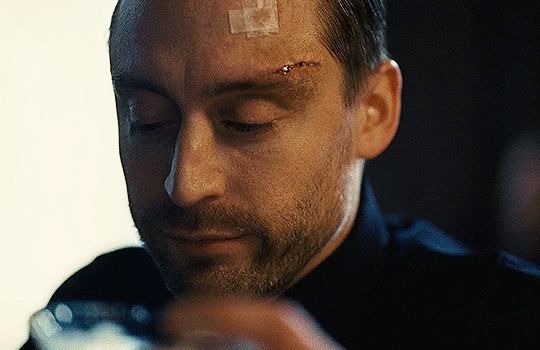
find me constantly here.
anyway, hi how are you how is your night going.
3 notes
·
View notes
Note
Thanks for the blog recs! And I love Delita/Ovelia too :,( they have such an fascinating and heart-breakingly tragic relationship. A little bit Shakespearean too. I read that fic you guys wrote and I thought it was so good and am looking forward to the rest of it. You mentioned that only a few fics have come close to your interpretation of their dynamic, what is it exactly if you don't mind answering? :0
Okay I'm so sorry for taking so long to get back to this, I was sitting on my answer for a super long time, wrote a huge response, didn't like what I wrote, and now we're here almost a whole month later. So I'll just try for coherent instead of articulate.
So there are a number of things I like about Delita/Ovelia that I look for in fic and such that I don't often see (such as a nuanced perspective on the class divide and an understanding of when and where their feelings develop [which I feel most people don't get quite correct]), but I'm just gonna go with the thing I care about the most, which is that if there was never a point of the narrative where they genuinely loved each other, the ending doesn't make any sense.
To me that's a no-brainer, but, just from some stuff I see circulating in the FFT fandom, I often wonder if other fans have drawn this same conclusion. I think folks like to focus in on the dysfunctional aspects (me too!), but weirdly enough I think they shy away from acknowledging the source of the dysfunction? Which is that these two characters care deeply about each other. Either this is coming from people who seem to believe genuine, warm love cheapens the dysfunction (which is a slippery slope into my beloathed "Delita is a wife beater" fics), or fans who like one of the characters and so don't want to show their genuine love, because they know if they're sincerely in love, that makes Delita's actions worse. WHICH IS THE POINT!
It's not a tragedy if they're not in love. Delita's problem is that, in his quest for the throne, he's even using the people he cares about--Valmafra calls him out for this in nearly as many words. If he doesn't care about Ovelia, that entire message is lost, and the ending ceases to have any parallel meaning to the Ramza situation (which we know can't be the case, because Ovelia CITES RAMZA as part of her reason for attempted assassination).
Also, think about the big betrayal scene. After he thinks Ovelia has already left, he gives Orran and Valmafra his wonderful villainous monologue, detailing what he's done and what he'd like to do. Like this is it, this is the thing that tells us what Delita wanted all along, after the entire game he's finally being open and honest about his schemes. And he specifies it's for Ovelia. He doesn't know she's listening, so it can't be part of a gambit to trick her--so he has to genuinely believe that that's what he's doing. Why would he insist that if he didn't care about her? He can't even admit to himself the level of cognitive dissonance he has about the situation because he loves her. When she stabs him, he doesn't expect it at all; it's this horrible, unpleasant surprise, and for a guy who has contingency plans all the way from A-Z, That Says Something.
And if Ovelia doesn't care about Delita, she has no reason to feel betrayed! You can't be betrayed by someone you don't trust, first of all. Second of all... this is more of a personal quibble, but. Okay. Picture a world in which Ovelia does not love Delita and, despite the big hug she gave him in one of the most important scenes in the game, doesn't trust him either. Ovelia's story, more than any other character's story, is about her soul-crushing loneliness. If she doesn't like Delita, then after she leaves Ramza's party, she is totally alone for the rest of the game. Save for that single interaction she has with Orran, suggesting she has at least one friend in the Southern Sky, she has no one except this guy she doesn't trust or like. Idk that just sounds miserable? Like, unflinchingly, disproportionately miserable? After she's already led such a miserable life? Tragedies are meant to be cathartic, but if there are no hope spots in Ovelia's life, no points of humanity and kindness and levity, it's not cathartic to me. She just led a horrible life in which she was a terrible victim and then died. That doesn't hold any meaning for me, personally.
After that critical scene mid-chapter three, they've addressed their loneliness and are now allies. They believe it's them against the world, and that they will rise to face it together. They're not alone anymore; they have each other. It's this beautiful, cathartic conversation that makes their doom inevitable. This is why Delita's betrayal even matters! This is what makes their particular tragedy so meaningful to me; it's not just Delita's Machiavellian wiles and Ovelia's deep-rooted paranoia that clinches their fate, but the basic, undeniable, extremely human need for companionship.
If they didn't love each other, Ovelia wouldn't have felt betrayed by the realization that he was using her, but if Delita hadn't intended to use Ovelia from the beginning, they never would've been in a position to love each other! It's that specific, unbreakable cycle that drives me absolutely crazy and makes me feel heretofore undiscovered emotions. You can't separate love from the tragedy. Love is the reason there is a tragedy. It's the title of Chapter Four, for goodness' sake.
Anyway. Not saying my spouse and I don't take our own massive liberties when writing them. We add a lot more humor and warmth than what's present in the game (since FFT is fairly somber and humorless). But all of those things are meant to accentuate the eventual tragedy, not argue with its very premise.
#this is still not articulate or what i want it to be but i need to answer the question so. here ya go#hopefully that answers your question#quiznaibus#fft blogging#i guess#now if you'll excuse me i'm going to go back to saying insane things about joanna newsom
10 notes
·
View notes
Text
R&J Clown Takes Round ♾ —Part 7
Featuring the ever-classic “R&J is/is not a romance/tragedy/comedy!!!” and Juliet being a very calm character compared to Romeo the drama queen. So calm.
‘R&J Is A Tragedy, Not A Romance!!!’
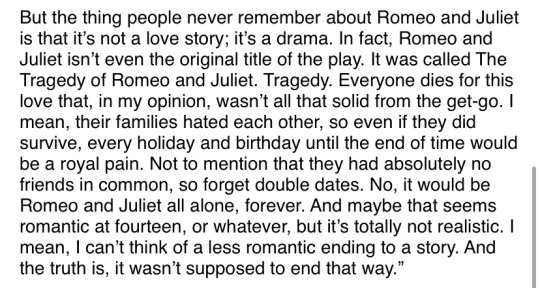
This is an excerpt from an R&J high school AU YA novel, by the way, for context (When You Were Mine).
I don’t know which is funnier, the narrator 1) thinking that drama and romance are the exact opposite of each other (shh, don’t mention Titanic) or 2) the narrator believing that the deaths were because of R&J’s love or 3) the narrator assuming that the families would still be feuding in this AU in which R&J live and are together. Or that the worst that would happen in this AU where the families still hate each other but know R&J are a thing is really awkward birthdays and holidays. 🤦♀️
In-canon, the Friar’s plan has always been for Romeo to lie low in Mantua, have his friends beg the Prince for clemency, and then when it is granted, to “blazon forth” the news of R&J’s marriage. The plan changed slightly when Juliet was forced to marry Paris, but regardless of R&J being together in Mantua or not, the plan to clear Romeo’s name and return to Verona would not be altered in the slightest. If everything went well and R&J turned up in Verona with news of their marriage, the Montagues and Capulets could still disown them, sure, or else work long and hard to annul the marriage. R&J could be trapped in the middle of that mess and end tragically anyway. But the families could also just accept the marriage as fait accompli and reconcile. It just depends.

“This isn’t even the greatest love story Shakespeare ever wrote! No, the greatest love story Shakespeare ever wrote that is not R&J is…well. Er. Shit. Well, you know what I mean! It’s obvious. So obvious I’m not even going say it so my BS can be called out.”
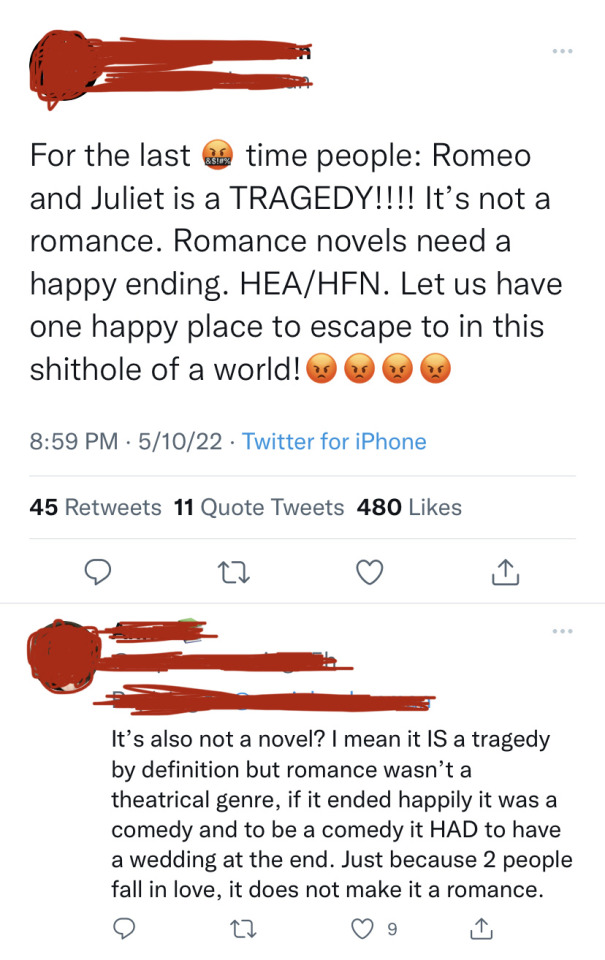
Where to begin with this mess?
So no, R&J is not a romance in the modern genre sense of the term. What we call the romance genre now is very different than the love stories/romances of yore, with or without happy endings. Again, genre are artificial classifications that change throughout the years. Also, as reply OP has pointed out, R&J is not a novel.
That said, comedies of the era, while commonly ending happily with a wedding, was not always the case. Comedy was often employed more broadly to mean works set in real-life social conditions, as well as social and political satire. There was a subgenre of comedies called city comedies, popular during the Jacobean era, following city or mercantile characters in London. A lot of those city comedies dealt with themes of crime, poverty, and corruption—dark comedies, in short. Shakespeare dabbled a bit in this genre, but it definitely wasn’t his strong suit—both his comedy, tragic, and romantic visions were mytho-cosmopolitan, not a purely London or local one.
With regards to Romeo and Juliet, it falls under tragedy in every way by the era’s standards and by Shakespeare’s. It ends with great misfortune/loss/death on all sides, there is no B comic subplot, it focuses on universal psychological states and character study/clashes rather than strictly on social and political satire, and it follows the Shakespearean conception/deviation of Greek tragedy: It is entirely preventable from the outside, not at all from the inside.
By modern standards, though, R&J’s intense focus on the protagonists’ love relationship would slide it into romance. YA romance, to be specific, or a YA novel in verse. Maybe Adult Romantic Suspense just on the sophisticated level of writing alone. Let’s not pretend most teens are up to reading metered verse.
Romeo the Diva

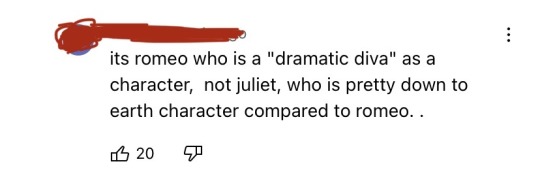

Romeo Montague. Such a drama queen. Irrational, rash, emotional. Whereas Juliet is just so level-headed, sensible, down to earth.
And so, so calm.
Like when she gets angry at the Nurse when she doesn’t tell her what Romeo said. Or when she says that Romeo being exiled is even worse than her entire family and herself and Romeo dead. Or when she curses the Nurse’s soul to hell when she suggests she marry Paris and forget Romeo. Or when she threatens to kill herself if the Friar doesn’t come up with a solution to her getting married to Paris ASAP. Or when she is afraid of the potion not working and her marrying Paris, so she puts her dagger on the side of her bed just in case.
So rational.
Like when she finds out about Romeo killing Tybalt, condemns him for it, and then condemns the Nurse for condemning Romeo for it. Or when she refuses to let Romeo swear by the moon, because *tsk* that moon be a fickle bitch, y’know? Or when she imagines herself being buried alive or else going mad and playing with her dead ancestor’s bones and—holy shit, is that Tybalt come back as a ghost to haunt me??!! Go away, coz!!!
So down-to-earth.
Like when she likens Romeo to a falcon or a little bird she’d like to tie a little silk thread and play with as she pleases. Or when she likens her love for him as deep and wide as the sea. Or when she calls on an anthropomorphized night to take him and cut his face into little stars when she orgasms on his dick. 😌 Or when she tells Romeo it’s totally not the lark that he heard, but the nightingale and that growing light??? in the horizon???? is totally the reflection of the moon’s light, promise.
Or when she straight-up calls Romeo her own personal god.
Romeo: What shall I swear by?
Juliet: Do not swear at all.
Or, if thou wilt, swear by thy gracious self,
Which is the god of my idolatry
And I’ll believe thee.
So calm. Why can’t Romeo just be more chill like Juliet????
I have no clue why these clowns insist on making these personality distinctions between Romeo and Juliet that are not supported by canon and even blatantly contradict it. As I have said before and will say again, Romeo and Juliet are two sides of the same fucking coin, and to disparage one is to disparage the other. Yes, Juliet makes sure she gets the ring on her finger before accepting anything from Romeo (as she should). Yes, despite her emotional flailing she eventually pulls through and rallies herself. Yes, she is quick-witted and acts with great courage. Doesn’t mean she doesn’t also fall apart and isn’t a rash, dramatic queen at points.
#romeo and juliet#rj clown takes#romeo hate dumb#i’m not sure what is worse#the juliet-is-calm-and-rational or juliet-is-aggressive-and-dominant#both are pretty clownish#juliet has her moments let’s say
21 notes
·
View notes
Text
Chapter 8
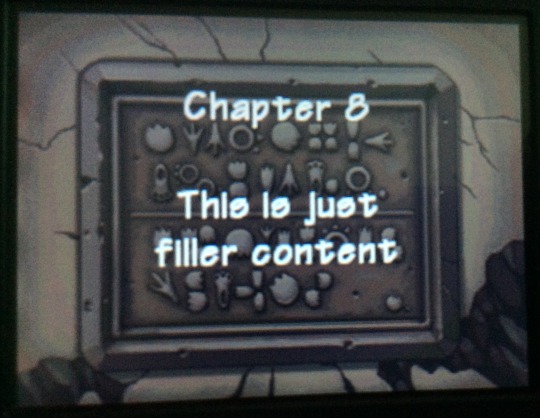
This is just filler content
Um, rude?? Plot wise, this is the chapter where we get the ball rolling, even if only just a little bit. Kicking the tiny snowball down the hill, if you will.
I’m a little surprised I could get this out so soon, but that’s because this chapter felt like a breeze compared to the last. Let’s dive right in!
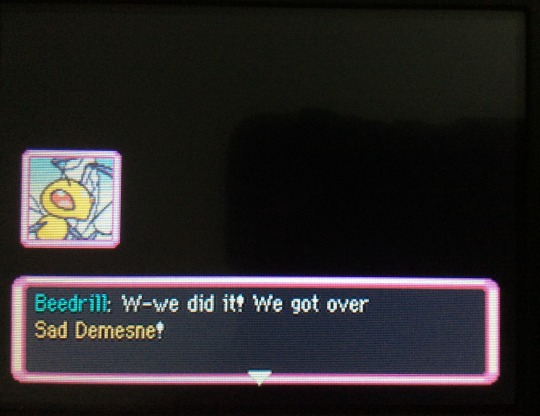
*faint muffled sobbing* It’s been three thousand years...

😥 Tropius. Tropius, I swear it wasn’t our fault. Tropius. Tropius, pls.
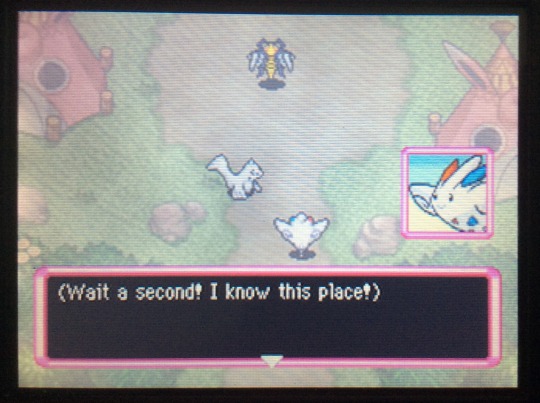
Boom. Here it is. The first inkling of who Teresa really is. So subtle as to be undetectable.
The shot heard ‘round the world fired not with a bang, but a whisper.
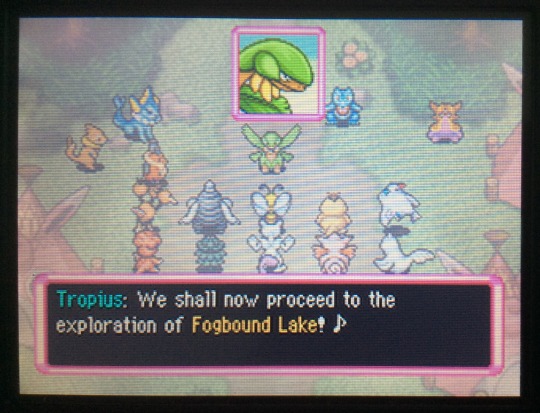
Bro how embarrassing would it be if we finally got there... and realized we’ve been calling it the wrong thing this whole time... ha ha just kidding... unless?
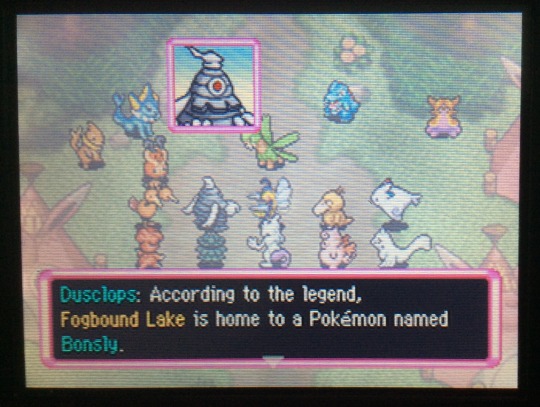
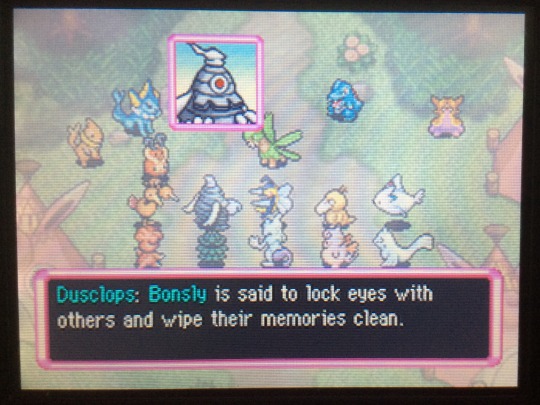
Oh my god, please please please tell me Uxie is actually Bonsly. I’d love to see a tiny baby that disguises its sweat as tears try to defend a Time Gear.
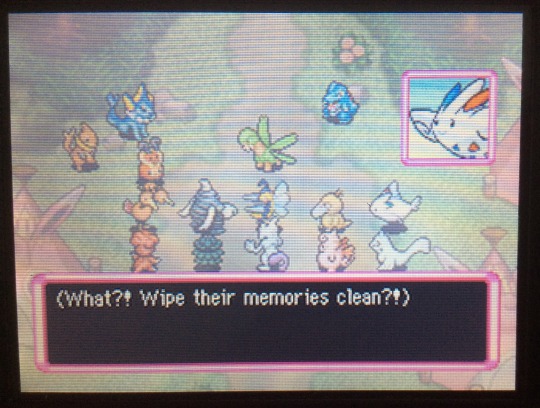
🫢
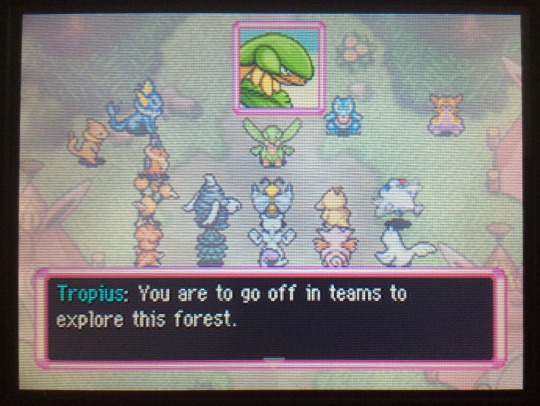
Y’know Tropius, I’d love to, but Teresa is having a bit of an existential crisis right now, so... Rain check?
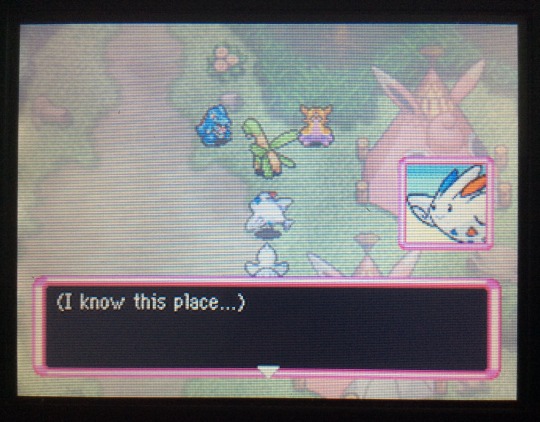

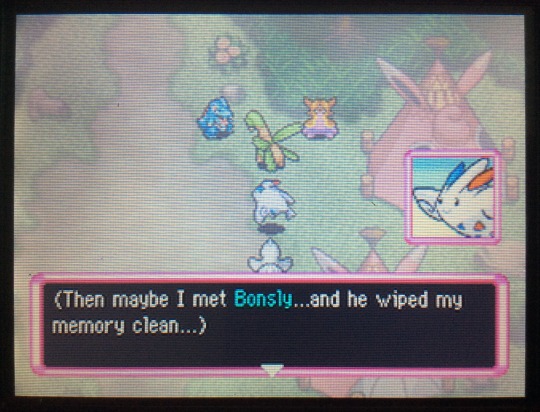
The first time I played Explorers, I totally thought this was the answer. Very clever Red Herring on their part.
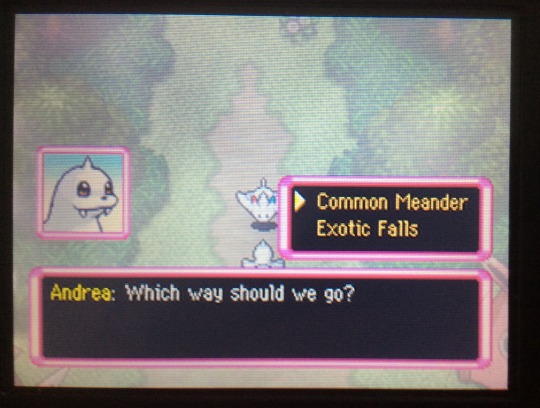
This time, I decided to explore the side path first - in this case, Exotic Falls. It sounded a lot more exciting than Common Meander, and after having such a rough time with Sad Land, I figured the extra experience couldn’t hurt.
But what’s this??
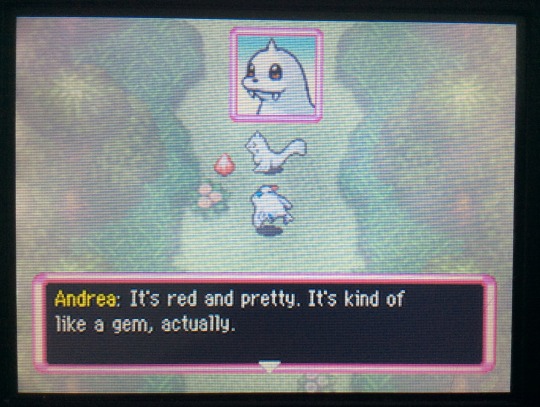
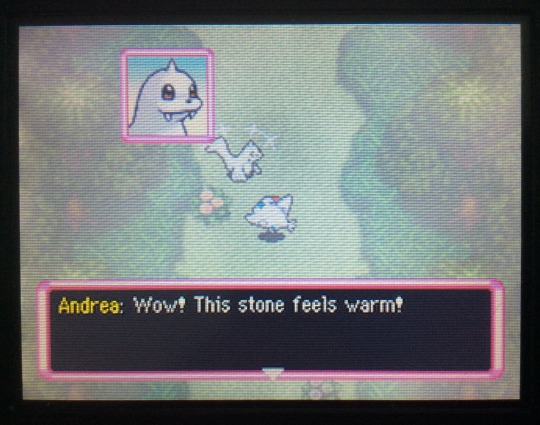
Wh. The key to the lake is just. Sitting there. Out in the open. Just like how Andrea “happened to find” the Relic Fragment. Yes, I know, convenience for convenience’s sake, but also... C’MON NOW!
Imagine you failed in saving the world because these items were actually kept hidden. Or because some rando scooped it up before you did. And you’d never even know! A tragedy of Shakespearean proportions.
...Hm. I’m starting to realize I’m sounding like CinemaSins. Moving on.

A very fitting aesthetic for the dungeon name!
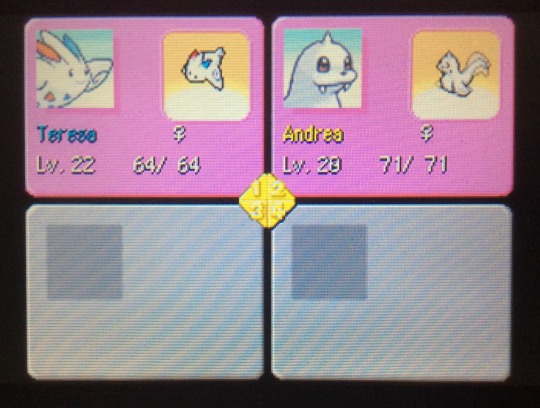
It was subtle before, but now it’s a lot more obvious that Teresa and Andrea are drifting apart on the experience curve. Teresa levels up faster, but has less health - and barely gets a boost to any of her stats. She’s especially hurting in defense, and I doubt that’s likely to change. And she hasn’t even learned a single move through level up. Probably never will, since Togekiss is an evolutionary stone form.
Besides that, I actually have little to report here, as Exotic Falls is only five floors. Although I did run into a Tyrogue with Dark Void (*war flashbacks*) and Sky Attack, which was scary for a second.
So, onwards!
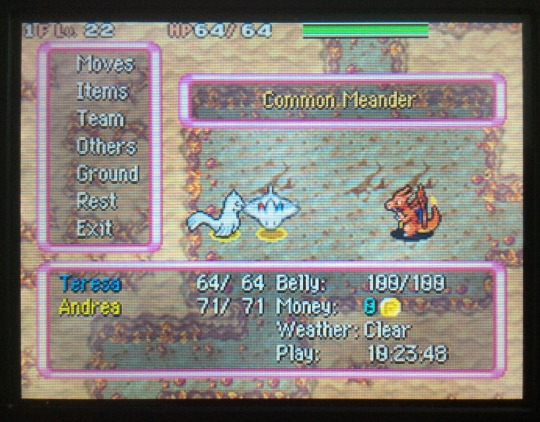
Common Meander... Oh, dear. Your name is deceiving 😬
Earlier, I happened to pick up a Dough Seed. I decided to bring it with me, since I’m hurting for money. (I NEVER have any when there’s a Kecleon Shop.) I was curious if the randomizer actually allowed the Dough Seed to function or not. At first, it didn’t seem to do anything - on the next floor, the room I spawned in was filled with the usual random junk. But then I did find a couple of Poké, which is far more than I can say for literally any other dungeon thus far.
Final answer: It... sort of works?
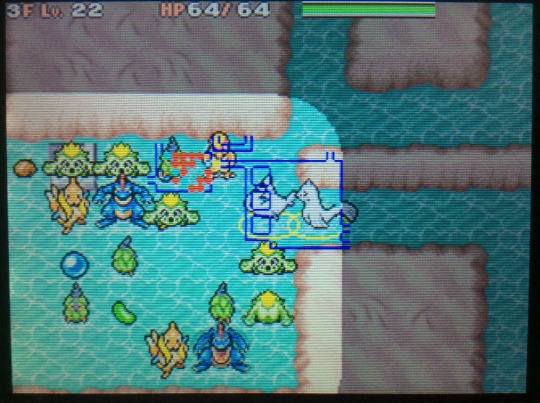
*big long heavy sigh*
Thankfully, Blizzard took care of this one real quick. Honestly, I probably wouldn’t have made it this far without it.
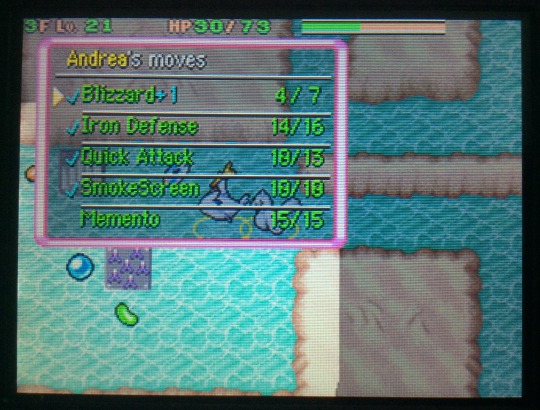
Andrea... why do you keep trying to learn moves that aren’t helpful? I just want what’s best for you ;-;

I just thought this environment was neat!
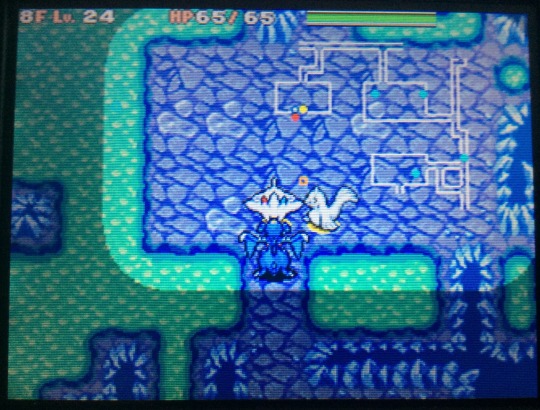
WOAHHH, hey there, buddy...! I don’t mean to intrude... You got any work done on those claws recently? They look nice, real nice... Very sharp and menacing. Nooo, I mean it! Ack, don’t growl at me... Dear God please let us pass, I have a wife and children.
Thankfully, we manage to get away relatively unscathed...

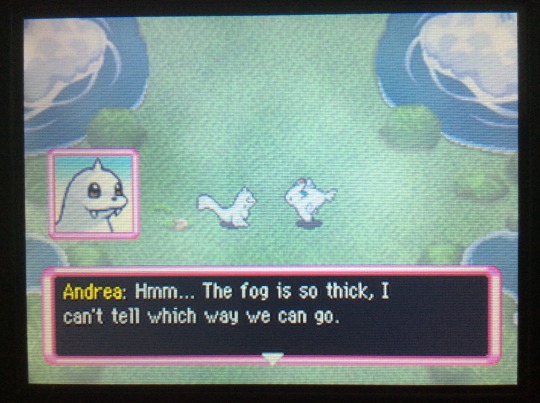
Here’s what you do: sliiide to the left... sliiide to the right... two hops this time! Two hops this time! Take it back now y’all.
What, you might end up somewhere eventually.
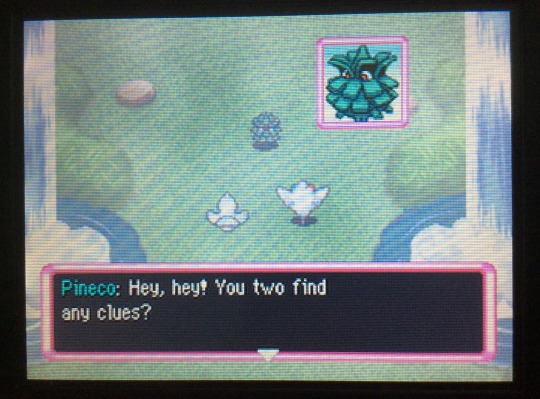
After Andrea shoots me the death glare, I never thought I’d be so relieved to see a pine cone in my life.
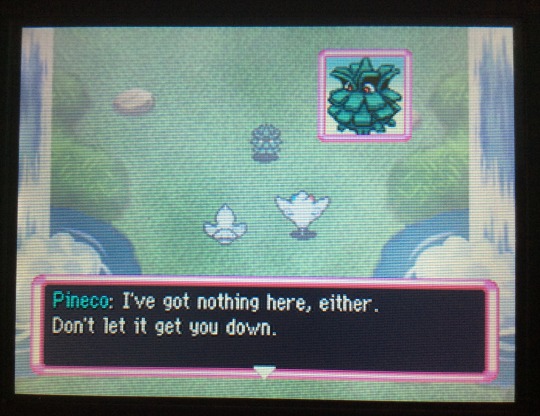
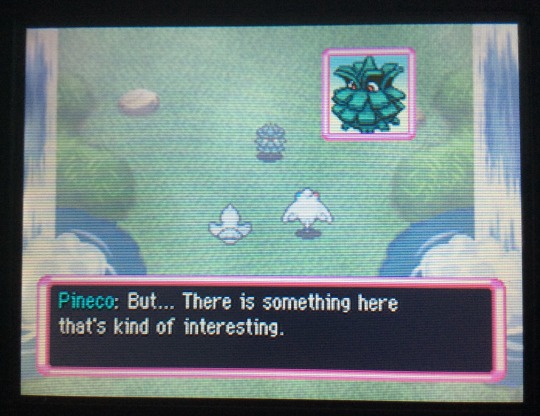
👀 I wouldn’t say that’s nothing! Show me.

It’s a Groudon statue jutting into the ground? Duh. I know the fog is impeding your vision, but let’s step it up here, Andrea.
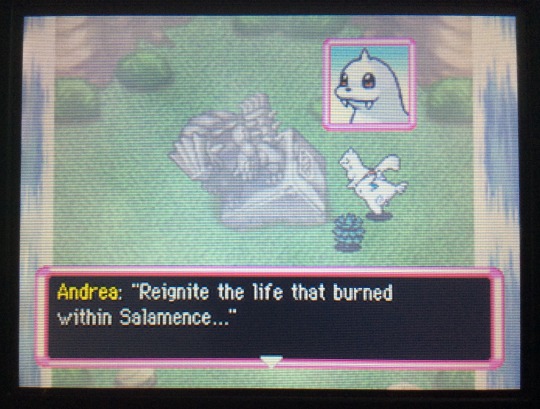
Salamence? Oh no.
I was hoping I could laugh at Groudon being replaced with a Luvdisc or something, but that doesn’t seem to be the case 😓

I- *folds hands together* Andrea, my love. What did I just say? That is not Salamence.
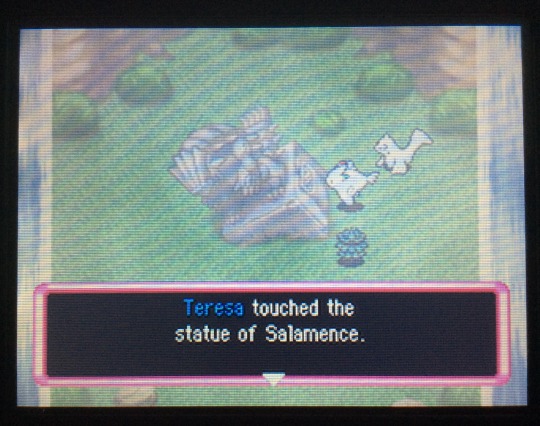
Andrea: “Hey Teresa, do you think you could do that thing where you touch something and gain temporal ESP?”
Teresa: “Oh yeah, I can try it. Ha ha, I almost forgot about that. Hope I’ll see something useful this time!”
Pineco:
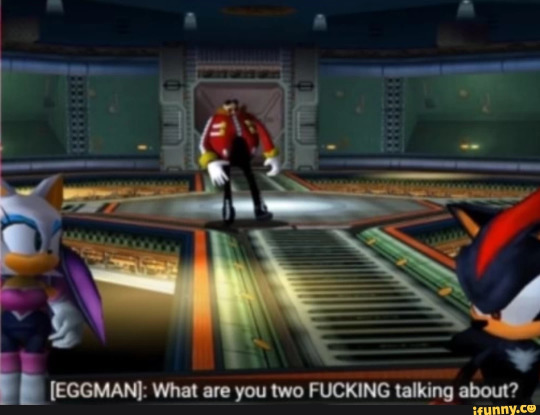
It’s okay man, we barely understand it either.
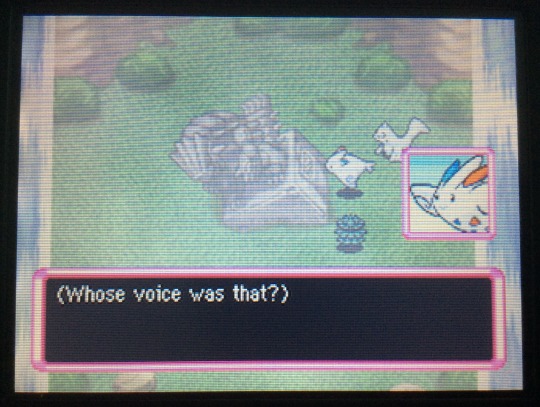
I’ve always wondered if this was Grovyle’s voice or yours in the flashback... I guess it can be interpreted either way.
Now introducing Teresa the sleuth!


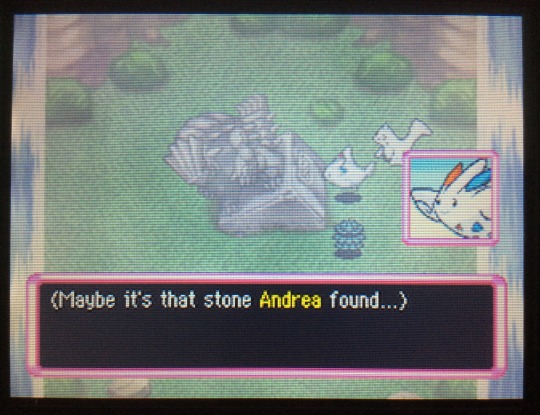
More like a simple deduction of logic, really.

(Hnnng... see those ripples? The fog effect kind of messes with the screen display, at least for my cheap camera.)
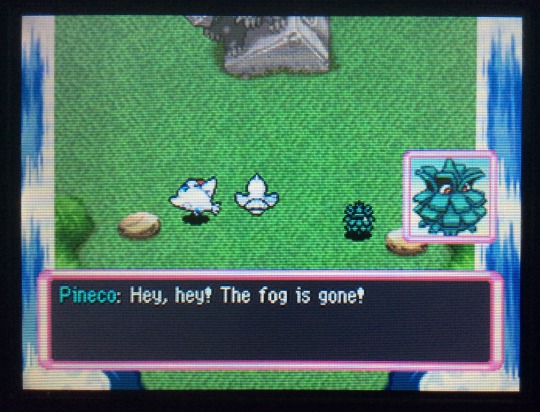
Thank you, thank you, I know I’m a genius 😎
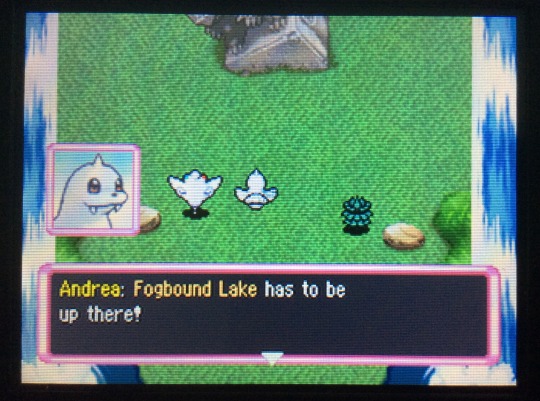
I wanted to include the beautiful art here, I really did. But my photo limit is real tight for this chapter. Besides, my camera simply can’t do the image justice.
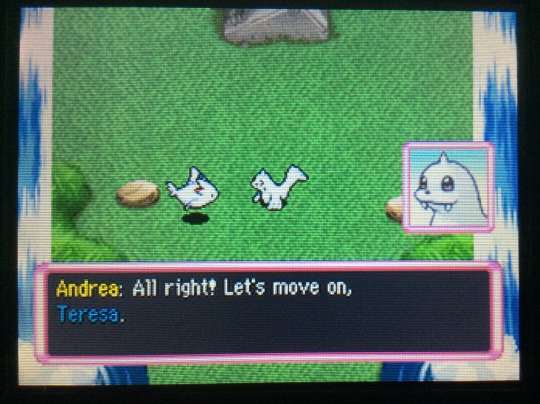
Sure thing, Andrea! ...Wait. Why do I hear march-like music gradually getting louder-
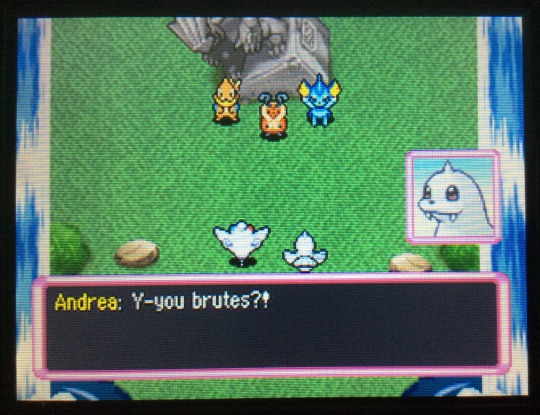
Dammit, man! This is why we can’t have nice things.
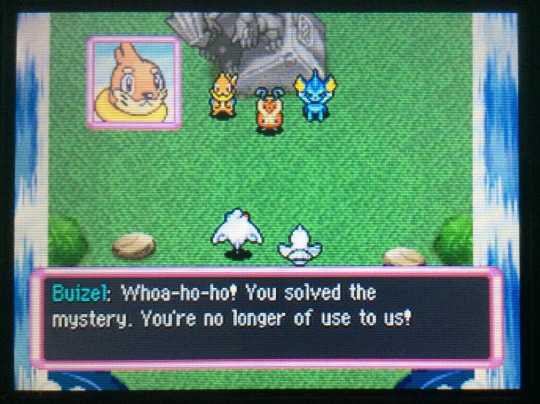
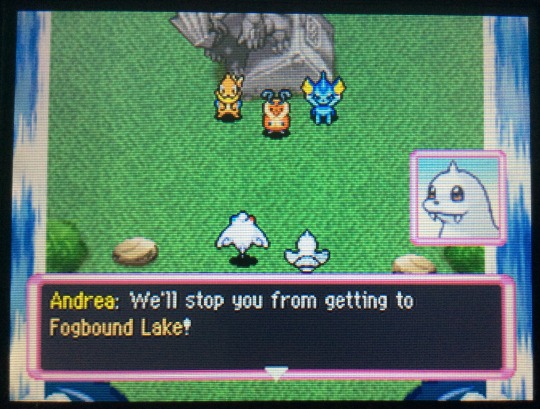
Tensions rise. Claws come out and teeth are bared. We’re gearing up for the ultimate showdown, but then-
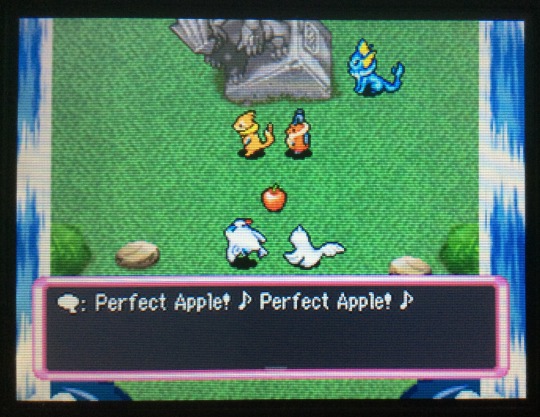
...Saved by the bell Apple!

God, I still find it so funny that this little Totodile is our superior in rank to everyone here.

Another mid-attack frame? It’s different than the one from before! Presumably because it’s shown from the side.
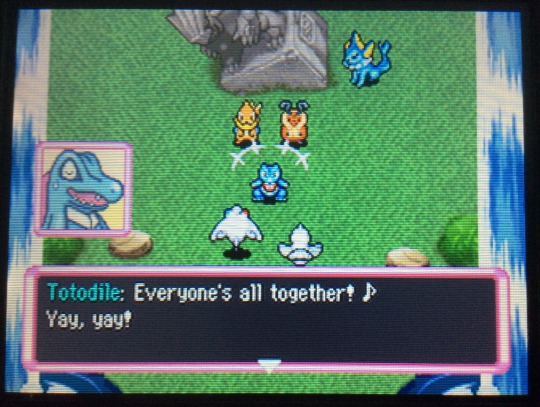
Sldkdhjfdgfdhks I can’t... such babey. He’s just so happy everyone is here.

Going back to the first time I played Explorers... I thought this meant “You’re going back towards base camp” and he prevents you from going any farther. But nah, instead you just kinda sneaky sneak your way forward.

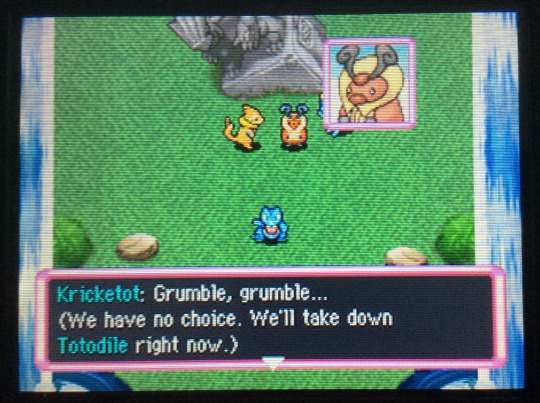
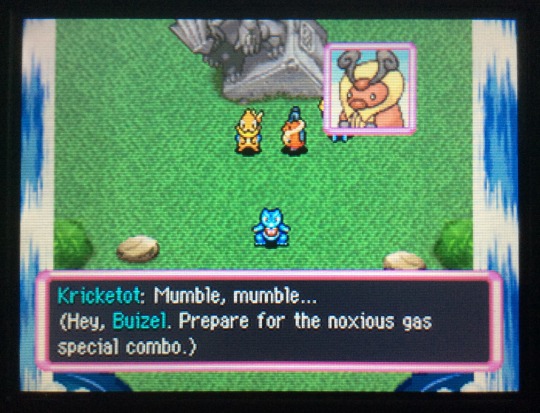
*dramatic cartoon narrator voice* DUN DUN DUNNNNNNN! A nail-biting, cliffhanger ending! Can Totodile survive the overwhelming stench of a stinkbug and a water weasel? Can Team Heavenly square up against a Salamence without getting their butts kicked? Most importantly, can the guild finally start calling Fogbound Lake by the right name?! Tune in next time to find out, exclusively on TH channel!
If you made it this far, thanks for reading 😊 I won’t even feign ignorance this time: the Chapter 9 title is... bizarre, to say the least. Look forward to it, and stay hydrated! 💧
13 notes
·
View notes
Note
Thoughts on "prestige tv"? I could never get into compared to "cinema", even when everyone was raving about "Succesion" it just had something repulsive to it and why I never checked it out (and funnily enough, it seems to be forgoten by now...)
Yes, it seems pretty ephemeral. People still talk about The Sopranos, I guess, in an annoying and semi-ironic way—I never watched it and don't intend to—but most of the other "prestige" dramas of that time are gone (Six Feet Under, anybody?). Gilmore Girls has been retconned into "prestige" but was teen trash at the time. What's next? "Welcome to the OC, bitch!" Often what survives to be "classic TV" was not regarded as prestigious at the time. The "prestige" network TV in the decade before the "prestige" HBO shows, for example, was represented by ER and NYPD Blue. Who remembers those? We remember The X-Files among the dramas of that era—a semi-trashy cult/genre thing from the disreputable fourth network—and a handful of sitcoms of varying degrees of intellectual ambition or artistic merit (Roseanne, The Simpsons, Seinfeld, Friends, Frasier). But even these might disappear with generational turnover: once the people who grew up with those shows and the immediately subsequent generation who watch them as kind of "anthropology" of their parents' time are gone. Can TV be timeless? It's very topical, very zeitgeist, not to mention killingly commercial. When I think of the Boomers as a generation, I think of ads for Thirtysomething I remember seeing when I was a kid. I've never watched one second of Thirtysomething. Do you even know what Thirtysomething is, élèves? L. A. Law. The Practice. China Beach! I'll Fly Away! These were important! People talked at the proverbial watercooler! Suddenly Susan. Hearts Afire. Party of Five. The Class of '96. Where are they now? I'm not even saying it's all bad. Some of it was good. Do you know what Roc is? I keep telling you to watch Aeon Flux and Millennium. But somehow you just can't hold on to TV. One knows in general about I Love Lucy or about All in the Family, but are they watched? What about, e.g., Maude? Hill Street Blues? The finale of Cheers was a cultural event at the level of a presidential election—when's the last time you heard of Cheers, except trivially as the antecedent of Frasier? The sole surviving sitcom from the '80s, something one would still watch for pleasure, is The Golden Girls—which, to be fair, is really funny, probably the funniest sitcom ever, and deserves to survive if anything from that medium does.
My answer is rambling, I know, and reveals my '80s/'90s rather than '00s/'10s TV knowledge, but its emergent theses are these: 1. TV with its topicality and commercial drive isn't likely to make for great art; and 2. what does become great art is not always the art designed or reputed to be "prestigious" in its own time, the latter often being merely middlebrow. You will tell me I have to watch The Sopranos. The whole concept's too cute, though, and the people who like it are annoying, and, speaking of cinema, the first two Godfather films are true Shakespearean tragedy in a pop genre (mafia, etc.) of which I am otherwise skeptical.
1 note
·
View note
Text
Oh, the glorious quest to get published! It's like deciding you want to climb Everest but realizing halfway you're just in your backyard with a really tall ladder. Since the tender age of "I can write my name," I was convinced this path was my calling. Networking? I thought it meant making friends with spiders. Persistence? My middle name (not really, but it sounds cool). Consistency? Well, let's just say my breakfast choice is as consistent as my writing schedule.
Writing? A breeze. Editing? A slightly gustier breeze, but manageable because, let's face it, perfection is a journey, not a destination. It's like telling a caterpillar to hurry up and be a butterfly already. And don't get me started on the arts and crafts analogy. Ever stared at a painting and thought, "This needs more cowbell"? That's me, questioning my artistic choices.
Ah, the dreaded imposter syndrome, the invisible gremlin whispering sweet nothings like, "You sure you're good enough?" during my most creative moments. It's like having a backseat driver in your brain during a solo road trip.
College, ah, the land of opportunity and all-you-can-eat dining halls. I decided to transform my so-called 'negative trait' into a glittering career by joining the university publishing house. Emailed the prof, and bam! Editor-in-chief. My friend compared it to vaulting from bank customer to president in a heartbeat. Imagine my pride, trying to be the humble shepherd amongst my flock of fellow club members.
But, oh, the drama. I had not anticipated the Shakespearean levels of tragedy and comedy, inspired by toxic reality TV and "Mean Girls" reruns. My generation turned the publishing club into a gladiator arena, but with more backstabbing and less physical exertion. It was less about nurturing literary talent and more about who could orchestrate the most dramatic exit. Ah, to be young and convinced everyone's out to get you, instead of just out to get your manuscript published.
The first fortnight with the publishing club was like a literary honeymoon. We were all hearts and flowers, discussing potential masterpieces and brainstorming themes that would make Shakespeare wish he had a pen pal like us. But then, as if Monday of the third week was cursed by a bored reality TV producer, she made her entrance. Let's call her Scarlet, not just for her artificially crimson hair but for the drama she was about to unleash.
Scarlet was miffed, to put it mildly. She seemed to think the editor-in-chief throne was hers by divine right, a sentiment somewhat dampened by her late arrival on the scene due to an apparently crucial vacationing spree. When we first met, and our hands awkwardly collided in what history might record as the least enthusiastic handshake, I naively thought, "Hey, maybe she's got a point." So, in a moment of misguided generosity, I offered her the crown. Big mistake.
Unbeknownst to me, Scarlet was not alone. She had a posse, a veritable velociraptor squad, if you will. It was baffling. Why crave the editor's chair so badly if you're already rolling deep with connections and subtly hinting at the professor's impending doom? And then there was her mentor, a Miami-based author with an ego so inflated he probably thought Hemingway was his pen name. Scarlet was rumored to be the poster child for nepotism, a Nepo Baby™ in the flesh, and I was about to learn what happens when a clueless "commoner" like me accidentally steps on the toes of the nepotistically privileged.
It was like being in a wildlife documentary, except the predators were armed with laptops and the ability to make you feel utterly incompetent with a mere glance. I had unwittingly entered the arena, and the games were about to begin. Welcome to the jungle, folks, where the beasts type fast and the alliances are as stable as a house of cards in a wind tunnel.
This brought about the delightful saga of dealing with a photography enthusiast whose strategy for winning affection was about as effective as using a sledgehammer for brain surgery. This charming individual seemed to believe that bombarding me with hate mail was the secret pathway to romance. It was a strategy so misguided, it made me wonder if his camera was also stuck in negative mode.
There I was, gnawing my nails down to microscopic stubs, embodying the very picture of stress-induced dysfunctionality. Picture this: juggling caretaking duties, moonlighting in a job that had me questioning my nocturnal preferences, only to waltz into academia's version of a gladiatorial arena.
The grand finale of my editorial misadventure was being relieved of my duties, courtesy of Scarlet's relentless theatrics, which apparently were too avant-garde for even our esteemed professor. "At least you didn't give up, and hey, one of your pieces got in," was the consolation offered, a band-aid on a bullet wound—until, in a plot twist worthy of a daytime soap opera, my piece was axed from the publication faster than you can say "editorial discretion."
Fast forward through a few years later to a night of poetic justice at an open mic event at my university. Lo and behold, Scarlet was there, perhaps scouting for her next victim or simply lost on her way to a more melodramatic venue. In the ladies' room, she offered a compliment on my poem, a gesture so dripping with nepotistic magnanimity, it could have watered a small garden. I acknowledged her with a nod that was as heavy with irony as it was light with forgiveness and exited stage left, grateful for the diverging paths that spared me further encounters with the queen of mean.
As Scarlet ventured into the wilderness of the music industry, presumably to charm or terrorize new audiences, I pondered the possibility of her discovering kindness. As for me, I gleaned a priceless lesson from the school of hard knocks: when faced with bullies, standing silent is not an option. Next time, I'll be ready to turn the microphone into a megaphone for justice, because sometimes, the pen (or the spoken word) truly is mightier than the sword—or the camera, in this case.
#poetry#poem#creative writing#writers and poets#dead poets society#fiction#original poem#poets on tumblr#poetsandwriters#drawing#spilled poetry#spilled words#spilled thoughts#because my damn brain never shuts up! there's no way my soulmate would just be getting one random thought appear on them 😭#funny shit#funny#coming of age#drama#reality#college#lgbtq community
1 note
·
View note
Note
What's your take on tragedy? Not necessarily the genre itself, but its permutations through literary history. Obviously the progression from Greek tragedy to Shakespearean tragedy is pretty clear, and it's the one a lot of people point to. But there's also a version of it in, say, Chinese television, particularly period fantasies. I find that Chinese tragedies, while preserving the structure and character construction of tragedy, tend to end on a more hopeful, bittersweet, or even ambiguous note (for example, Chinese Paladin 3). What do you think?
I guess this is a big question, and I don't think I have much to say.
I read a bunch of these Chinese dramas when I was a kid, and while I loved them, I'd be hard-pressed to describe any of them in the way you've outlined. I don't recall any "tragedies with hopeful or bittersweet ends." All of them had grim endings, as sad and awful and terrible as they were. The fact that I can recognize these endings as "tragedies" might say something about them, but I don't know if I can say anything with any confidence about the contents of those tragedies. For example, I definitely remember reading a long and gloomy Chinese-style tragedy with a sad ending and a lot of talk about how the characters were tormented by a terrible, horrible evil, but I'm having trouble remembering what happened.
I have some vague thoughts about why the Chinese take the "grim" route to tragedy. I am less familiar with Chinese literature than I am with Asian literature in general, so this is less of a definite answer than a kind of general observation. I can imagine several reasons why people might like to tell stories about grim endings, and I don't know which one or ones would be most interesting in this case.
One reason might be just that they have a strong sense of dramatic closure. If a story closes in a way that is satisfactory, then it's satisfying on a very deep, intuitive level, even if it does so in a way that seems "wrong." A story in which every episode leads to a happy ending, which then leads to a happy ending, which then leads to a happy ending, seems less like a story that satisfies an intuition of "what this story should be," or of "what this story'should do.' "
A second reason might be that endings in which there is a kind of catharsis to "cleaning up the mess" are satisfying in themselves. I don't have a sense of what this would mean for the genre, if it did exist, but I suspect it would look something like "having a character get his comeuppance for all his (or her) sins" or "having one of the characters' wishes be granted." Some genres are just really into that, and one way to go is to do it in a very graphic fashion (e.g., the ending of the movie The Ring), which is just too far for me in the case of "tragic" stuff.
A third reason to write in the "tragic" style is that some people just seem to like to make sad art in ways other than "telling a happy story." I feel like many of the people who write (or consume) such art don't mind how the tragedy was resolved. They don't seem bothered by whether or not the suffering was eventually relieved. And that's fine, but there's a subset of people (often the same subset) who love sad art without any interest in its satisfying resolution. They find the story satisfying just because it's about someone suffering, without caring whether the person goes on to suffer other things and be a "better person" in a meaningful way. I wonder why some people do this?
I have no idea what to say about any of this. I do think you're onto something there about how "tragedy" is a genre that's just "a thing people do," and we should perhaps be less bothered by people doing it, or at least less bothered by doing it while trying to justify it by "realizing" that sad stories need to have "realistic" endings.
All of this is a bit more interesting than the question you asked, but I don't know enough to say much interesting about it.
13 notes
·
View notes
Text
scourge killing tigerstar was honestly one of the top plot twists of all time like the whole series you think it’s leading up to some big epic tigerstar/firestar good versus evil confrontation and then he gets mcmurdered by some rando, literally disemboweled, and dies nine times in a row in what is actually an alarmingly graphic scene for a book series targeted at the late elementary reader...masterfully done imo
#honestly the first six books of the warrior cats series is like. INSANE poetic cinema like the scene where yellowfang kills brokenstar?#shakespearean level tragedy i tell you THAT
20 notes
·
View notes
Text
Fuck it, I wrote the goddamn essay
I'm far too invested in this series so heres my far overthought essay on Merlin as a Shakespearean Tragedy
Okay this is just a rough outline of what I want to talk about, but the basic premise is that merlinBBC lines up to be a perfect Shakespearean tragedy (ST)
The nine points of a ST ~
The Tragic Hero ~ Arthur is The tragic hero but Merlin also fits into it on a more personal level. Arthur is a man of great presence and station he fights all the monsters and dies in the end, He has this great destiny that lays heavy on his shoulders and he unknowingly drives the plot for most of the show (I just realised how much of this show Arthur just doesn’t know about? Like the entire plot is happening behind him and he’s just having a sword fight (sub thought, that is exactly how I would frame this if I directed a play of Merlin))
Good Vs Evil ~ Morgana sort of handles this all on her own? She is presented as the moral compass of the show and is then slowly manipulated into a position of villain although there is a more complex look at this being represented by merlin gwen and morgause but that would take an awfully long time to explain
Fatal Flaw ~ typically this is given to the Tragic Hero™ but because Merlin and Arthur sort of split the spotlight this is applied mainly to Merlin. Merlin is deeply and unshakingly loyal to Arthur and while this is initially and somewhat veiled as loyalty to his destiny and the future he’s fighting for, it’s easily evident from his actions in “the sins of a father” that he is quickly becoming more loyal to Arthur than magic and chooses Arthurs well being over the fate of magic kind.
Tragic Waste ~ this is the idea that the hero will die before completing all he could do, and if that doesn’t sound like Arthur then we didn’ watch the same show.
Conflict ~ the corruption of merlins and morgana from morgause and Killgarah is the real core conflict of this show, if those two characters had never been there none of this would ever have happened. While i would agree that they could have done it better the main theme of this shows conflicts in manipulation,
Dichotomy of villainy ~ we are left by the end of this show unable to really take a side because everything felt preventable, for this reason morgana’s death and Merlins victory still feels mostly hollow
Supernatural element ~ I feel like this is fairly self evident
Ambiguity of poetic justice ~ “good will always triumph and evil will always suffer” is the simple moral code that most writing goes by, however a ST subverts this, often having its good characters commit acts of moral ambiguity and the hero inevitably fails or dies in the process. This is doen in MerlinBBC with Merlin never fulfilling his destiny and Arthur never repealing the ban on magic. We can suppose given Gwen's scene during the battle of camlann that she will most likely repeal the ban on magic and raise merlin to the title of Court Sorcerer as is vaguely hinted towards given his position in her coronation scene.
Comic relief ~ STs aren’t all sorrow and hannes acts, they have their fair share of jokes and funny moments. We can see that in some of the more joky episodes, but also in things like That tavern scene.
The last piece of this tragic puzzle is the most obvious, the five seasons of Merlin are the five acts of a Shakespeare play. I've made a handy chart to understand what I mean. Because it's a t because its a tv show and therefore worried about viewers returning the act structures isn’t broken up perfectly, but it still fits fairly well. The thing that leaves people bitter about the end of this show, I think, is because they expected the show to settle, to find a rest in its ending, what we got instead was a camelot that (while still having a trusted monarch) was still in turmoil, and a shot of merli alone and sad 1500 years in the future still waiting for arthur.
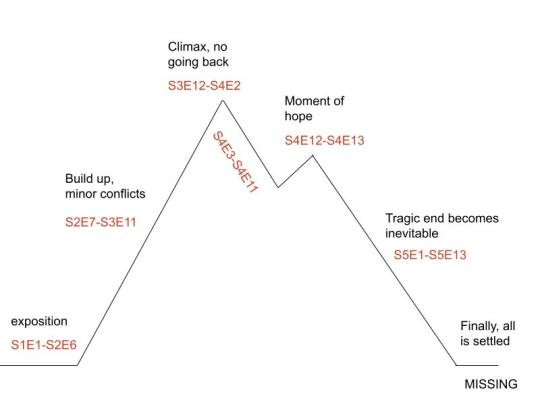
What happened with merlin is that we never got the finally, “everything will be okay” moment and so we are left wanting
The themes of Merlin are a dichotomy of Peace and Equality Vs corruption and manipulation, this is displayed through the main characters of Merlin, Arthur, and Morgana, with each being manipulated and corrupted by Killgarrah, Uther, and Morgause respectively. This is shown best through the use of Forked Path. (which I weirdly can’t find any articles or anything for? Which is odd given how popular it is but anyway) the Forked Path happens anytime the characters are presented with two strict choices without much wiggle room, both of which could end badly in the long run but must nonetheless be chosen between. This is very clear with season two's story arc between merlin and morgana, in which merlin must either kill his friend to prevent a possible future, or let her win and risk the demise of albion. Merlin attempts to avoid this, temporarily disabling Morgana from enacting her plans and the like, but in the end he is forced to choose. Arthur is continuously presented with the problem of whether to trust and show mercy to magic. Morgana is presented with either killing Uther and freeing magic, or running from camelot and lending to the further persecution of the druids. The thing you might notice is that these are all linching on Merlin and whether or not he tells the truth, his silence provides false dichotomies for the other characters. This is the manipulation I mentioned earlier. Merlin is led to believe again and again that he Must commit acts against his morals to save Arthur and therefore Albion. But as no fan will hesitate to point out, he never really had to. This is a show of the trope of Self Fulfilling Destiny that's found in all tragedies since ancient greece. Merlin’s attempts to stop morgana directly lead to their conflict, his keeping his magic a secret to protect arthur ultimately leads to arthur's death (having only met “evil” sorcerers arthur never repealed the ban and so mordred sides with morgana). If Merlin had followed his own heart then all would have worked out well, but instead we see Killgarrahs manipulation stop merlin from acting in camelots best interest.
#Merlin#BBC Merlin#merlin analysis#this took waay too long and is so completely unneccissaary#(i really dont know how to spell that word)#I gave this show way too much credit#This is a rough draft by the way#I'll update/edit it later#but it's been siiting on my computer fro waay too long#Arthur pendragon#BBCM#bbcmerlin#knights of camelot#merlin emrys#morgana pendragon#i'm over tagging this but oh well#merlin#merthur#camelot#merlin essay
108 notes
·
View notes
Text
On Allegory, Imperfection, and Inadvertent Subversion: A small essay about Akimi Yoshida’s Banana Fish and Salinger’s “A Perfect Day For Bananafish”.
In the story of Banana Fish, Yoshida references Salinger’s short story “A Perfect Day For Bananafish” (which henceforth shall be addressed as “Perfect Day” simply for ease of reading) several different ways, both in-universe and out. It is exceedingly evident that the character of Ash Lynx is heavily based on Seymour Glass, and one might surmise that Banana Fish is an allegorical retelling of “Perfect Day”, especially given that in the original story, Ash Lynx dies of what is arguably a “passive suicide” – that is, when faced with an injury that isn’t immediately fatal, he chooses to bleed out rather than seek help, which when framed as a suicide, parallels the much more violent and sudden suicide of Seymour Glass.
However, this surface-level allegorical reading ignores a very important variable in the story of Banana Fish, namely the counterpart to Ash’s Seymour: Eiji’s Sybil. While Ash and Seymour share many similarities (both are traumatized, troubled geniuses with partly-Irish roots who grew up in New York City), the similarities between Eiji and Sybil are very few. Eiji does symbolize a world of innocence to contrast with Ash’s world of horrors, but unlike Sybil, Eiji is an adult with agency of his own, and though he retains some of Sybil’s childlike innocence and is able to connect deeply with Ash as a result of it, Eiji’s agency and decisions ultimately change the narrative and its meaning.
That is to say, by introducing Eiji as an imperfect Sybil, one who has agency and can actually provide Ash with understanding and support of the kind that Seymour never got from Muriel or others around him (and which Sybil, being three years old, was in no way equipped to provide), Banana Fish directly subverts “Perfect Day”’s original message of cynicism in the face of a material world unconcerned with the horror of lost innocence and its resulting isolation.
To understand what this means, it’s important to first understand the meaning and context of “Perfect Day” and the circumstances in which it was written. “Perfect Day” is a story written first and foremost as a critique of American materialism in the wake of WWII; Salinger echoes the concerns of the Lost Generation before him, in a way, by really driving home the alienation from modern adult life felt by those who were exposed to the horrors and traumas of the battlefields in wartorn Europe, only to return home and find a culture completely removed from it all. Seymour Glass is a stand-in for Salinger himself—Kenneth Slawenski, in his 2010 biography of Salinger, notes that on returning from the European theater, Salinger “found it impossible to fit into a society that ignored the truth that he now knew.”
If that sounds familiar, good, because it should! This is precisely the motif of “Perfect Day” (as well as some of Salinger’s other work featuring members of the Glass family, such as Seymour’s younger brother Buddy, which, as an aside, is a name that might stick out to Banana Fish fans. Whether this is an intentional reference or a coincidence, I can’t say for certain, but given the depth of other references within this allegory, I’m inclined to think it’s intentional).
As a quick summary for those who may need a refresher, “Perfect Day” is a story about a deeply traumatized man who feels isolated from the rest of society because of the weight of the horrors he has been exposed to. Muriel Glass, Seymour’s wife, is the epitome of this: she represents the materialistic culture that Seymour feels so alienated from, always talking about brand-name things and luxuries and upward mobility. Seymour rejects her company in favor of playing the piano for children and spending time on the beach, where he tells three-year-old Sybil Carpenter a story about bananafish, fish that gorge themselves on bananas in holes under the sea until they’re too fat to escape the entrances to these little banana dens, and then they die. Instead of dismissing this story as something bizarre, Sybil claims she sees a bananafish in the water, which endears her to Seymour, until she leaves, at which point he returns to his hotel room and shoots himself in the head.
In “Perfect Day”, this interaction (between Sybil and Seymour) is the center of a set of dualities. Sybil represents the state of childlike innocence that Seymour longs to return to, and because of her innocence, she can “understand” him in ways that the material adults like her mother or Muriel do not. Seymour’s isolation is a product of his society and the lack of support and understanding for traumatized veterans returning from war, and it shows in the way that adults his age cannot connect with him, and he cannot connect with them. This disconnect between worlds is what eventually results in Seymour’s suicide—he can fit neither in the world in which he wishes to be, nor in the one in which he must reside, and it ends in his death.
The question is, then, how does this relate to Banana Fish?
As mentioned previously, Ash Lynx is a very clear parallel to Seymour Glass. He’s a young man faced with immeasurable trauma from which he believes he can never recover, and there is a clear motif of duality in his entire character arc: his world (one of violence and trauma) versus the “normal” world (where innocent people who have “regular” lives may reside). Like Seymour, Ash feels trapped in a world he can’t escape, knowing “the truth” that he knows, about the horrors that people are capable of.
It follows, then, that Eiji Okumura is a parallel to Sybil Carpenter, who represents childlike innocence and a world that Ash longs to be part of but can’t reach. And to an extent, this is true: Eiji is sheltered and innocent, comparing real-life to TV shows and being completely unexposed to kidnappings, drugs, guns, and violence. However, there is a sharp contrast between Eiji and Sybil, one that fundamentally changes the relationship between Eiji and Ash and makes it radically different from that between Sybil and Seymour:
Eiji is an adult, and as such, he has agency of his own.
Unlike Sybil with Seymour, Eiji can make his own choices and face Ash as an equal. Where Sybil is a child who runs back to her mother after playing with Seymour at the beach, Eiji actively and consistently chooses to stay with Ash, over and over. He even explicitly tells Ash “you are not alone”, which is a huge and direct contrast to the message of inevitable, devastating isolation from “Perfect Day”. Whereas Sybil’s innocence serves as a reminder to Seymour of what he’s lost and cannot regain, Eiji’s innocence is a beacon of comfort and companionship to Ash. Eiji is someone with whom Ash can relax and be playful like a boy his own age, as noted by Max and Ibe watching them interact.
This communication and connection are present between Sybil and Seymour, but in a very different way. Seymour prefers to play make-believe and tell silly stories to kids, because he went from being a wide-eyed innocent to being traumatized and longing for a place to belong, and Sybil as a child represents what he wishes he had, while the adults around him (most notably Muriel, his wife) are a world he doesn’t understand that feels false.
This is not the dichotomy of worlds that Ash faces. Ash faces a world of trauma and suffering that he sees himself as trapped in, and a world of peace and security that he thinks is beyond his reach. Where Seymour yearns for a return to innocence, Ash yearns to escape his pain, and the combination of this subtle difference with the effect of Eiji’s agency and the narrative structure of Banana Fish results in a subversion of the themes in “Perfect Day”.
Banana Fish is a long-form narrative, while “Perfect Day” is a short story. Part of the inherent structure of a long-form narrative is character growth and development, which for obvious reasons is much less prominent in short stories. As a result, Eiji’s impact on Ash is clearly visible over the course of the narrative, and it becomes impossible to declare that Ash is firmly rooted in the world he sees himself as trapped in. By the end of the story, even Ash wavers on this assertion; although he ultimately succumbs to suicide, a narrative choice that been criticized ever since its publication, in the moments leading up to his stabbing, he does believe that Eiji is right, or at least right enough that he wants to see him one last time (this is ambiguous and open to interpretation, of course).
Why did this narrative choice spark so much controversy and outcry from fans? Not every story that ends in tragedy is criticized as poorly written for it; examples range from Shakespearean tragedies to “Rogue One: A Star Wars Story”, a film in which the entire cast dies in the climax. Yet just about all fans agree that it fit the narrative. Clearly, then, it is possible to craft a story that ends in death and tragedy but still feels well-written. What makes Banana Fish different?
I would argue that the answer lies in this imperfect allegory. By creating a Sybil-esque character that can interact with the Seymour-esque character as equals, can stay with him, and can listen to him and support him through his grief and pain, Akimi Yoshida inadvertently turned “Perfect Day”’s message on its head. The tragedy of “Perfect Day” is Seymour’s isolation. By giving Ash a warm, compassionate relationship in which he is assured over and over that he is not alone, Yoshida upturns this entirely.
Ash is led to believe in this dichotomy mostly by his isolation. He believes that since Eiji is in mortal danger as a result of being special to him, he needs to send Eiji to safety, i.e. somewhere far from him and far from the reach of those who would hurt them both. This isn’t a miscommunication issue or anything of the sort; this is Ash being afraid for Eiji’s life; Eiji isn’t averse to returning to Japan itself. Eiji is averse to returning to Japan without Ash, as he mentions when he talks about how Ash could be a model, and tells him about kami. In establishing this as a consistent tenet of Eiji’s character, Yoshida ensures that Ash is not isolated in the same way that Seymour was.
In addition, Eiji can move freely between both worlds set up in Ash’s perceived dichotomy, a motif made explicitly clear when Eiji leaps the wall to freedom and light at the beginning, leaving Ash (and Skipper) behind in captivity in the dark. Despite this escape from the world of violence and crime, Eiji returns of his own volition and stays with Ash, experiences his own fair share of horrific traumas, and still leaves in the end to return to his world. This makes it clear that the dichotomy is less stark than Ash is led to believe, unlike the repeated validation of his isolation that Seymour receives, and is another reason that the ending of “Perfect Day” is inconsistent with the ending of Banana Fish
A quick sidebar: Banana Fish has no real Muriel, but if pressed, I would posit that the closest parallel to Muriel that exists is Blanca, whose main purpose in the narrative seems to be to reinforce to Ash that he can’t escape the world he feels trapped in and longs to leave. But where in “Perfect Day” Muriel symbolized the materialism of American society after WWII, Blanca has no real established reason to be so invested in keeping Ash down, and in conjunction with the fact that despite his own traumas, he can retire peacefully to the Caribbean, his role in the story falls to pieces entirely. Where Muriel represented a lifestyle that Seymour fundamentally could not reach, thereby reinforcing his isolation, Blanca is supposed to parallel Ash to a degree, but his words to Ash do not match his actions whatsoever.
Therefore, if anything, Blanca’s assertions serve only to strike a contrast with Eiji’s (and Max’s, to an extent, since Max and Eiji both agree that Ash can escape this and they want him to heal). Moreover, Blanca’s relationship with Ash is that of a mentor and a student, a relationship that is shown to be fundamentally unhealthy, given that Blanca willingly worked for Ash’s abuser, a mafia don who he knew trafficked children. Some argue that Blanca was blackmailed into this service, but given that Blanca chose to betray Golzine at the end and work with Ash with seemingly no real provocation or change in his relationship with Golzine, this supposition seems flawed. Blanca’s assertions about Ash and his ability to forge bonds and leave his world the way Eiji does, and indeed the way Blanca himself does, are simply incorrect, and the narrative itself provides us all the tools we need to realize that Blanca is wrong, even without the extended context of a parallel to Muriel Glass.
Returning to the main issue at hand, i.e. that of the imperfect allegorical connections between Sybil and Eiji, and the dichotomy between worlds that Ash perceives, it’s clear that in creating a positive, nurturing relationship between Ash and Eiji rather than a one-off encounter, Yoshida inadvertently created a story about connections rather than isolation. Ash’s attempts to keep Eiji safe from harm by sending him home are countered by Eiji’s assertion that he only wants to go to Japan if Ash comes with him, which is a kind of selfless devotion that reaches through Ash’s isolation until he decides that he won’t try and separate himself from Eiji anymore, which is a massive blow to the dichotomy of his supposed two worlds. This is the narrative acknowledging that both worlds can coexist.
Not only this, but also Eiji, who has his own trauma—he’s kidnapped several times, shot at, drugged, sexually assaulted, attacked with a knife by a drugged friend, exposed to several deaths, shot at people in fights himself, and ultimately nearly killed by a gunshot wound—despite all of this, Eiji is still allowed to exist in the world of peace and regularity. Eiji’s innocence is sharply tempered by traumatic experiences, and he can still walk between worlds. If Eiji, Max, Ibe, Jessica, Sing, Cain, and Blanca can all experience traumas, why is Ash the only one who cannot escape? Is there some kind of magical bar of “too much” trauma, like an event horizon on a black hole?
Obviously, no.
So it comes to this: Essentially, the reason that the ending is so controversial, and why I personally believe that the open ending of the anime is an improvement to the original story, is that the allegory between Banana Fish and “Perfect Day” falls apart because of Eiji’s agency. Ash wants to protect Eiji, and to protect Eiji’s innocence and light, because he feels that it’s beyond his own reach, but Eiji forges a bond with him that is rooted in mutual respect and care, and in doing so, undoes the devastating, painful isolation that led to Seymour’s suicide. This is why Ash’s death can feel so hollow—it doesn’t follow the pattern of “Perfect Day”; after the entire story is about Ash’s bonds and those who love him unconditionally, it feels almost like a shock-value plot twist tacked on, rather than a tragic inevitability.
I don’t believe that Yoshida intended Banana Fish to be a subversion of “Perfect Day”. I believe she meant it as a one-to-one allegory, and this is why she kept the ending as Ash choosing death. However, due to the changes in themes because of the characters and their relationships, Ash is not isolated in the profound way Seymour was, and his death is therefore not nearly as impactful.
#this is 2600 words i am so fucking sorry but also im not sorry im just verbose#banana fish#banana fish meta#asheiji#ash lynx#eiji okumura
270 notes
·
View notes
Text
Episode 1 - “Glorious Purpose”

“Do a lot of people not know if they’re robots?”
Here’s the thing about being a fan of MCU!Loki (and, really, about many of the MCU’s characters) -- we have to keep getting lucky with the creative teams.
I’ve mentioned before that I didn’t really take notice of Loki until The Dark World, and my love of the character was sort of exponentially grown by both Ragnarok (and arguably Infinity War, in its weird way), as well as by Ewing and Garbett’s comics run on Agent of Asgard. I know of loads of fans, though, who love Loki best in his Avengers 1 appearance, or who loved him from his first appearance in Thor 1 -- and their mileage varies on their feelings towards The Dark World and, especially, Ragnarok.
And -- without getting too far side-tracked -- this makes sense, to me. While there have been some repeat writers on the Thor movies, Loki has been written by numerous people -- and the director of every Thor movie (as well as Avengers 1) has been a different person. It’s almost inevitable that every Loki fan is going to find some Stories better representations of “Their” Loki than others, because, hey -- what’re the odds that that new writer that comes along is going to write Loki in a way that made the character originally resonate with you?
I mean, granted, we’ve got one massive asset in our favor, and that’s Loki himself -- Tom Hiddleston. Hiddleston has, I think, worked hard to keep a through-line of logic to Loki; the character may have bounced from Shakespearean Tragedy to Supervillain With Pathos to Snarky Walking Shoulder Chip to Redeeming God of Mischief -- and onward to Heroic Sacrificial Avenger and Trickster Escape Artist -- but Hiddleston’s care and effort and very presence help tie it all together. (Also, there IS a logic to Loki’s ultimate character arc, there really-truly is -- but that’s a whole other post.) Still, the fact remains: if you’re a Loki fan, every next chapter of the character’s story has an element of luck to it. You have to be lucky, as a fan: that you keep getting writers that are not only good writers -- but that can tell a Story with this character that, on some level, resonates with what the character means to you.
All that said? I was hopeful, with Loki. I’ve never watched Rick and Morty, but the showrunner did at least have a comedy background (and I wanted desperately for Loki to actually get some comedy; he’s the god of Mischief, please let him have some comedy) -- and the showrunner and director Kate Herron both seemed to be invested in the project. Hiddleston was back, of course-of course, but there were other actors I enjoyed showing up (more on that in a minute). Best of all, the trailers looked right up my alley: I liked the time-traveling premise a lot, loved the quirky otherworldliness, the surrealness of it. (I’m a massive Alice in Wonderland fan.) So I had hope.
But I was well aware that, at the end of the day, the writing was either going to be good, or it wasn’t, and so I crossed my fingers and waited.
So I’m so excited to be able to truthfully say that the pilot wasn’t just better than I’d expected -- it was better than I’d hoped for, better than I’d dared to hope for.

One of the things I’ve been saying about my excitement for this series is that, as much as the Thor-and-Loki sibling friendship is my favorite relationship that Loki has in his life -- I was super-intrigued to see more about who Loki is when he’s not around Thor. It wasn’t until I was watching the pilot a second time that I realized that this is also the first time we are really seeing who Loki is when he’s around himself. I mean, we’ve seen glimpses of it, sure -- Loki reading his book for real in his cell when he gets the news about Frigga in TDW is still the moment I point at as the moment I officially became a Loki fan -- but still. Overall, it’s a rare thing.
And in many ways, this episode is all about who Loki is when he’s with himself. Not just in serious moments (like when he’s by himself and watching his own future play out on the TVA recording) -- but in littler aspects. The beginning of the show was almost surreal (we have waited so long, I can’t believe it’s really here, that I’m WATCHING it) -- and man, is it quirky and surreal and weird -- but I was pretty sure they had me hooked when a worried Loki is considering the sensor in front of him and murmuring to himself, “Do a lot of people not know if they’re robots?” Partly because it made me laugh out loud -- but also because I was so happy. We have not, to my knowledge, ever heard the god of Mischief make a joke almost entirely for his own benefit (I mean, I know the TVA clerk is there -- but Loki is really rather talking to himself). This was the moment Loki became the protagonist, for me, and in a quirky, funny, whistling-in-the-dark surrealist-humor kind of way.
In a weird way, the show almost has to create Loki as a character. Of all of Marvel’s non-main characters, I would argue that Loki is among the strongest of personalities; you know who he is, even averaging 20-30 minutes of screentime at the best of times in the films he’s appeared in. But while he’s had growth and regression and change and arcs -- he’s never been a main character before. That’s something new, and it gives the character a new feel -- while still being Our Loki -- and I was really impressed with that.
... and that may be because Waldron (showrunner Michael Waldron, that is) did something I kind of basically didn’t dare hope for -- he grounded the character in his Story up to this point. Not even just in Thor 1 and Avengers 1, which is all the Story that Loki has lived through up to this point -- but Waldron, kind of surpassing my wildest dreams, is also able to find a way to have Loki experience the rest of his Story, even though it hasn’t happened in his timeline yet. Loki gradually learning the events of TDW, Ragnarok, and Infinity War are a wonderful meta move, because -- while, no, the events haven’t happened to him, he hasn’t experienced them -- he at least knows about them, and has had a visceral emotional reaction to them, and been changed for knowing them, at least to some degree (subsequent episodes will tell us how much). That’s important to me because we, the audience, know about them, too, and completely erasing them in all aspects from this show would make for a kind of cognitive dissonance between the main character and the audience. I was grateful, grateful, to Waldron for making the events of TDW, Ragnarok, and IW matter, even if they weren’t experienced by Loki first-hand. But they’ve impacted him, as they’ve impacted us.
All that isn’t to say that Waldron and Herron don’t put the emphasis on the events of Avengers 1, and Loki’s actions and choices during that film, which is, of course, timeline-wise, the most recent things that have happened to Loki. I honestly expected the show to take up the Ragnarok baton of having Loki redeem himself partly through arcing (the Elevator Scene, choosing to be more, choosing to come back for his people and for Thor), but also partly through re-toning who and what the character is (ask me about the This One Time He Turned Into a Snake story sometime, because I have thoughts about that scene).
Never in a million years did I expect the story to actually interrogate Loki, and flat-out ask him: did you hurt all those people because you enjoyed it? As much as it’s not what I love about the character, or why I love him -- Avengers 1 is still Loki’s most famous, iconic on-screen appearance, and I give major props to Waldron and Herron for deciding to do something with that, to interrogate the character and get at the heart of why he does what he does. We need to check in with Loki, establish that he doesn’t hurt people for the joy or the pleasure of it, but rather because of what his own twisted philosophy has led him to believe about what it means to have power and courage and choice. This scene -- and his ability to (I think, sincerely, given what he’s seen? I know it happens fast, but: c’mon, y’all, they only have six episodes to play with) his ability to drop his bravado and his guard and admit honestly that it’s not want but fear that made him choose to be a monster -- is what, I think, opens the door into Loki being able to be, not just a protagonist, but a heroic one.

... and a shout-out goes here to Owen Wilson, who, wow-geez, just COULD not have been a better choice for Mobius than any other actor in the history of Marvelling. I will freely admit some bias here -- I’ve been a fan of Owen Wilson’s since the early 2000s -- but I kind of can’t get over how lucky we are to have him here. Because here’s the thing about Mobius: he’s here to be Loki’s friend. He’s here to be the guy that sees potential in Loki to be something more. And he’s gotta find it and see it at a point in Loki’s timeline when Loki is at his very worst -- when even Thor has given up any hope “of finding my brother still in there somewhere.” He’s also gotta see that hope without coming off as an idiot -- and I appreciated those moments where he uses the time-looping devise to keep Loki from, y’know, punching him in the face, or even when he comes back into the viewing room with a TVA “melt stick” at the ready in case the previously-escaped Loki has designs to do him in. Mobius is not shown as a fool ...
But he’s also incredibly kind and affable, and his patience and compassion with Loki seem genuine. Wilson has always played his characters with a kind of laid-back geniality, and I’ve always enjoyed it -- but here it becomes an incredible strength of this character. I can buy that Mobius is a timeless agent of time, I can buy that he has studied Loki and he knows him ... and I can buy that he is smart enough to be on his guard while also kind enough to approach Loki with empathy. The scenes with Loki watching his history and his future play out in front of him, while being interrogated about who he is and who and what he has chosen to be, don’t work without an interrogator who we feel is on Loki’s side while also not being blindly trusting of him.
I’d be remiss if I didn’t mention the clear fact that they’re doing some version of Agent of Asgard, a Story that is desperately important to me. It’s a version that has different shades to it, of course -- Agent of Asgard’s Loki is trapped by the universe’s perceptions of him, and his perception of himself, while Loki-Series Loki seems trapped by time itself: the timeline happens how it happens because it has to happen that way, and what does that say about choice? (Indeed, Choice Vs. Fated-Timeline seem like a driving force of the show, thematically -- right up to Loki bitter acknowledging that his once-vaunted boast I am burdened with glorious purpose has become a cold truth that he has existed up to this point to cause suffering and destruction so that those around him can become “the best versions of themselves.”)
Of course, being inspired by Agent of Asgard (right down to thanking Ewing and Garbett in the end credits Marvel at some point you gotta start paying these creators for their ideas tho), the journey of the Story -- and of the character of Loki -- is probably in line with the idea of refusing to fit in the box the universe (or the timeline) wants to stuff you into, because -- as a wise god of thunder once said -- you can choose to be more. Whether or not the streaming series sticks the landing for me the way the Agent of Asgard comic did remains to be seen -- but, for now, I can honestly say I’m pretty psyched to be along for the ride of finding out.
#on board the loki bus#loki series#loki series spoilers#thank you for the commentary loki it's not at all distracting
32 notes
·
View notes